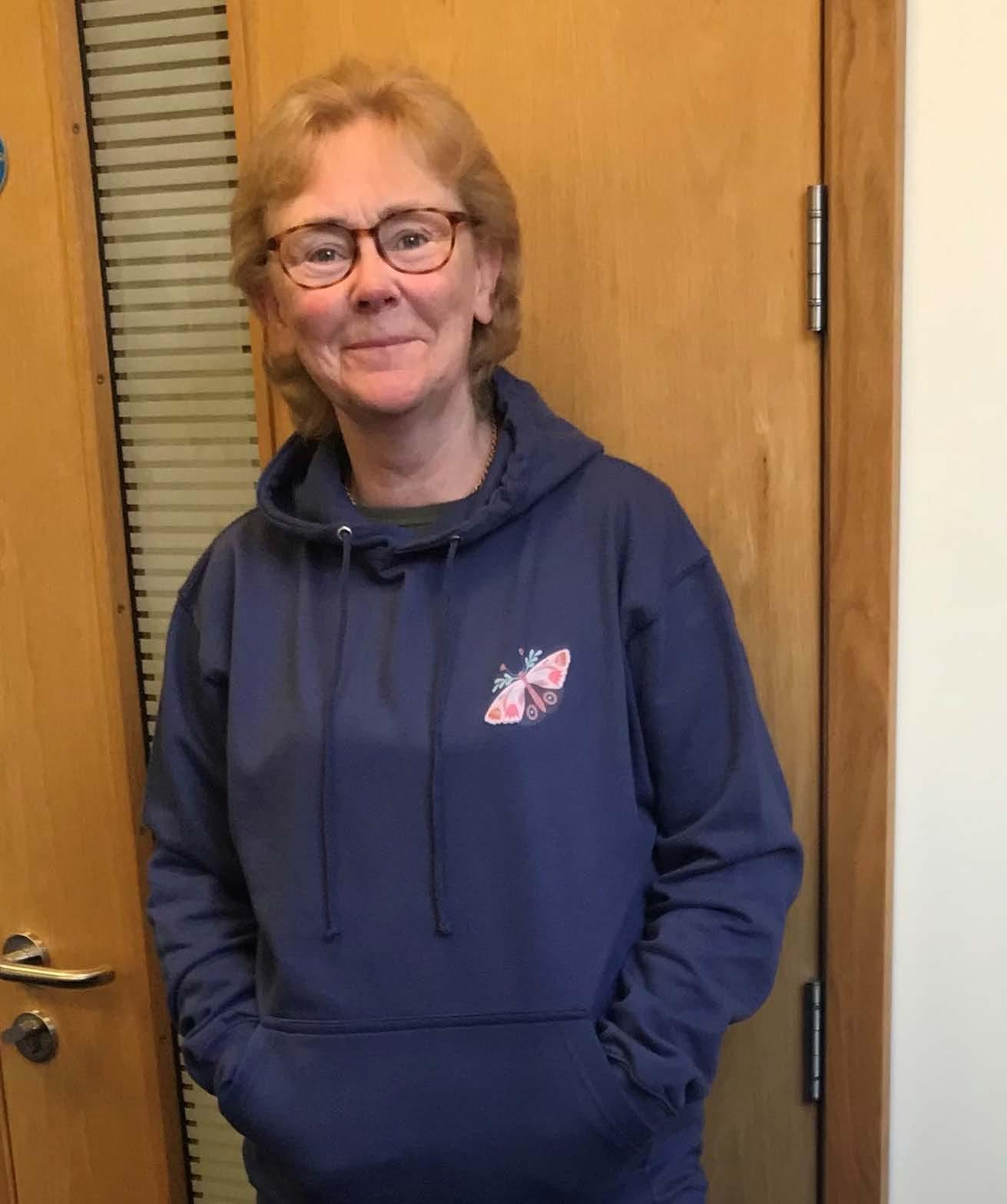WIDER WORLD
Autumn: September - November 2023

Why corporate prayer matters
Devotional by Valerie Murphy Hillhall PW
Autumn: September - November 2023

Why corporate prayer matters
Devotional by Valerie Murphy Hillhall PW
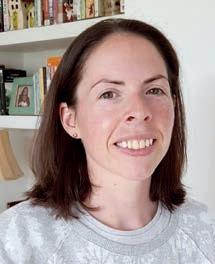

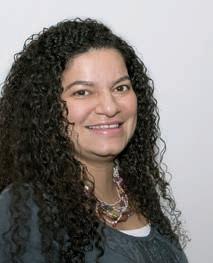
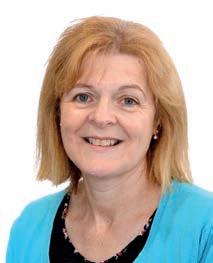
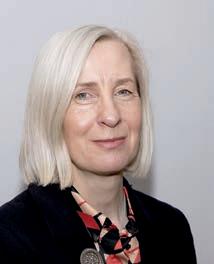


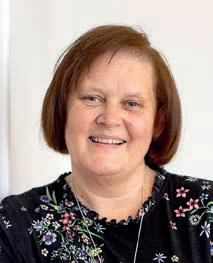

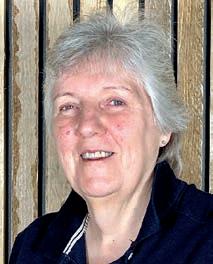
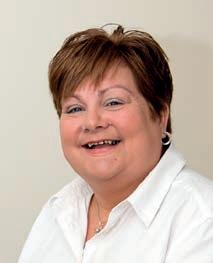


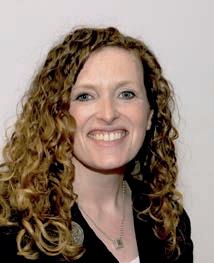
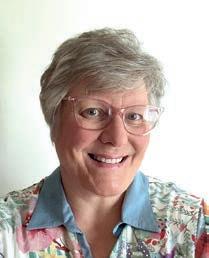
As we enter a new season, and the leaves of the trees begin their change into a kaleidoscope of colours, here is a question for youdoes your prayer life need a little transformation?
We all know the importance of prayer. Amy Carmichael wrote: ‘Prayer is the core of the day. Take prayer out, and the day would collapse.’ To give us some clear focus on this, we have a special prayer feature this edition and we are grateful to Andrew Dickson for sharing his insights with some practical tips.
Corporate prayer isn’t easy but when we relax into it and really share what’s on our hearts, it can lead to deeper communion with our brothers and sisters as we wait on the Lord to bring sense of some of the things that frustrate and confuse us here on earth.
Private prayer is vital too and did you know, one way you can do this to support God’s Church is to pray over the Wider World? Each article contains stories and insights and you can be praying for them all from one edition to the next.
As well as raising funds for our Special Overseas Project, prayer will help women in the Middle East who are coming to faith in Jesus, thanks to the sterling work of SAT-7, introduced to us by Julia Jolley. Read all about the project and the transformation of lives through the medium of television.
One line that really stood out to me in Julia’s article was, “When we reach women, we reach other people too. Helping women means helping everyone.” What a powerful reminder of our role as women and our caring nature to look after others.
Whether we are training to be a deaconess or minister or learning the ropes of being a Sunday School teacher or GB Officer, we each have the wonderful capacity to help others to see Jesus. And not just in what we say at the front of a hall or a church, but through our lives as we seek to share Jesus by our actions.
The women of Hillhall Presbyterian are testament to this in their compassionate knits that are sent all over the world to help others in need through their Helping Hands. What a blessing they have been, and continue to be. With our hands, we can truly bless others and lift high the name of Jesus.
Whether we support others with physical gifts or financial aid, when we add prayer to what we do - God is able to transform lives and communities through his wonderful grace! May we each be encouraged this season, to do what we can to bring glory to God, and God alone.
Freelance Editor: Rebecca McConnell
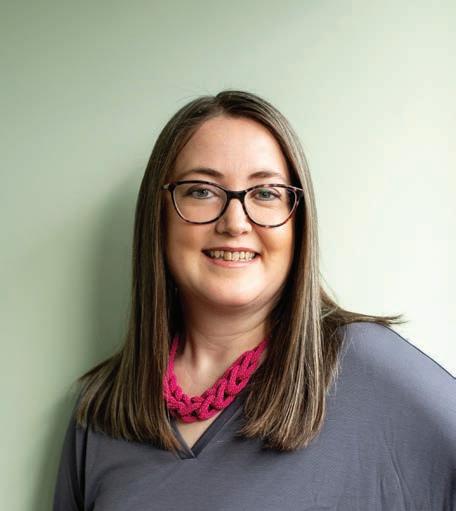
Contact: Presbyterian Women, Congregational Life & Witness Department, Presbyterian Church in Ireland, Assembly Buildings, 2-10 Fisherwick Place, Belfast, BT1 6DW.
Email: pw@presbyterianireland.org
Web: www.presbyterianireland.org/pw
Tel: +44 (0)28 9041 7257
Like us on Facebook: Presbyterian Women
Digital download: issuu.com/presbyterianireland
Designed by: Break - madebybreak.com
Wider World is the magazine of PW. Published quarterly: March, June, September and December. Annual subscription: £7/€8 or £1.75/€2 per issue. Each year, an order form will be sent to Wider World agents. This should be returned, together with payment, to the above address. If required, invoices will be issued upon receipt of the order form. Cheques should be made payable to ‘The Presbyterian Church in Ireland’ marked Wider World on the reverse.
The Editor reserves the right to accept, reject or edit contributions. Opinions expressed in Wider World are not necessarily those of PCI, Presbyterian Women or the Editor.
Presbyterian Women’s Special Overseas Project for 2023/2024 will focus on the incredible work of SAT-7 and their work with women across the Middle East and North Africa (MENA). Julia Jolley from SAT-7 tells us more.

Heba*, from Algeria, was desperate. In an unhappy marriage and feeling suicidal, she felt she had nowhere to turn…
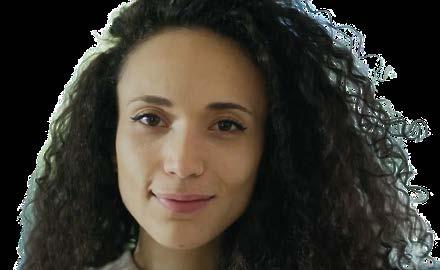
“I had no self-confidence and I became weaker and weaker. I even contemplated suicide,” said Heba, who was in despair over her husband’s drinking and adultery. One day, Heba was browsing Facebook when she came across SAT-7 through our Facebook Family page. Bravely, she reached out for help.
“That same day, Marianne arranged to call me,” said Heba. “She lovingly gave me her time, and I shared my struggles. Marianne gave me advice and prayed with me. I finally felt released from the trap of a deep well that had closed in on me.”
Marianne, SAT-7’s Arabic viewer support team manager, didn’t leave it there and connected Heba with an online discipleship group.
“Since then, my life has gone from misery to joy,” Heba said. “I learnt how to be a disciple of Jesus Christ. I can even see changes in my husband. I thank SAT-7 because it was the main reason for the change in my life.”
There are countless women like Heba in the Middle East and North Africa (MENA). Trapped, lonely and hopeless. But through SAT-7’s faith-filled programmes and digital media – and the vital follow-up provided by our viewer support team – many are finding the joy and freedom that comes from knowing Jesus.
Şemsa Deniz Bakır, a presenter on SAT-7’s Turkish channel, said: “My biggest dream is to show that there is always hope with the living God. When we reach women, we reach other people too. Helping women means helping everyone.”
It is so easy for us as women in the West to take for granted the everyday rights and freedoms we enjoy: the freedom to wear what we like and go wherever we want; pursue higher education and career opportunities; travel unaccompanied.
In the MENA, women’s rights and freedoms are denied to varying degrees in different countries, from being required to have a chaperone to travel, or having to work in the home instead of going to school – but this is notably severe in Afghanistan. “Since the Taliban takeover, girls in my homeland have been deprived of the most basic freedoms such as education and sport,” shares Mariam, a SAT-7 viewer from Afghanistan. Women, increasingly, are prisoners in their own homes. Women’s mental health is suffering and already high female suicide rates are increasing.
In neighbouring Iran, nationwide protests broke out last September following the death in custody of Mahsa Amini, who was detained by the country’s morality police for not wearing the hijab properly. In the harsh crackdown that ensued, hundreds of women and girls were killed by the Iranian security forces.
The protests were seen as the biggest challenge to the regime since the 1979 revolution, but Iran’s leaders are not showing any signs of easing restrictions.
Other issues facing women and girls across the MENA include early and forced marriage; domestic violence; confinement to the home; and Female Genital Mutilation (FGM).
In this challenging and often brutal context, SAT-7’s programming on satellite television and digital media activities for women aims to:
- help women and girls recognise their individual value in God’s eyes
- give them a platform to make their voices heard
- strengthen their families and communities
- equip women to challenge negative social attitudes and effect positive change
As Christian women across the Presbyterian Church in Ireland, we want to reach out beyond ourselves and come alongside other women across the Middle East and North Africa.
Presbyterian Women hopes to raise £10,000 to enable this vital ministry of SAT-7. We will also be praying that women and girls in such difficult situations may know the fullness of life in Christ.
Kennedy, Presbyterian Women’s Ministry Development OfficerPopular live talk show Insiders, on SAT-7’s Persian channel, gives women a platform to discuss topics that are widely treated as taboo in Persian culture. Presenter Sally Momtazi said: “We have been standing with the Iranian people, raising awareness, hoping and praying for a free Iran where women, life and freedom are honoured.”

A recent episode explored how domestic violence, child marriages, and confinement to the home are on the rise. Guests discussed how in Iran alone there were 700,000 child mothers. Feedback from male viewers highlights their support for women and desire to see them treated with dignity and respect.
Kian, a male viewer, wrote: “Thank you for the topic you have selected – a discriminatory view of women is simply unacceptable in the modern era… They have effectively made women into objects for sale and there is nothing said about genuine love and faithfulness.”

Women in Türkiye also face significant challenges, most notably gender-based violence: hundreds of women are murdered in the country each year, and astoundingly almost 40 per cent are subject to domestic violence.
SAT-7 TÜRK presenter Şemsa Deniz
Bakır believes that women’s rights and conditions reflect the state of society. The channel is using Şemsa’s programme Homemade, among others, to serve the needs of Turkish women. The content is focused on inviting Turkish women to see themselves and their lives through the eyes of a loving God. As a result, women from diverse backgrounds are sharing their testimonies on screen. Many viewers begin following Christ as a result of these programmes, and the team collaborates with local churches to provide new believers with support.
A female viewer in Türkiye said: “The existence of ministries like SAT-7 in this country gives us confidence and makes us feel that we are not alone.”
I came across your programme on SAT-7 TÜRK. You were doing patchwork so I started watching. The next day, I turned on the TV again and you were saying something about Jesus; I was very curious. I really liked the programme. Finally, as a result of everything I learned from you and the channel, I started following Jesus.Insiders: Sally Momtazi and Hengameh Borji, presenters of Insiders on SAT-7’s Persian channel
Today Not Tomorrow is a new programme on SAT-7 that is helping women – and men – to challenge inherited beliefs in their culture that affect the treatment and behaviour of both sexes.
“In Middle Eastern countries, we are often not encouraged to think critically. It’s not embedded in our education or our societal communication. We are often told this is the way it is, this is the way it should be, and don’t ask questions,” said presenter, Caroline Nassif.
Today Not Tomorrow is produced in a mobile studio mounted on the back of a pick-up truck, which travels all over Egypt, creating spaces for conversation with women from rural villages as well as local experts. Producer Maggie Morgan says they “exemplify the breadth of how women and girls in Egypt and arguably, across the Middle East and North Africa, are living restricted lives, stemming from beliefs and practices that have never been examined and rarely challenged.”
The rare opportunity for communal discussion is empowering women and men from various towns and villages to think, share opinions, and present a case for social change. “When TV programmes show stories like ours, it is enlightening and opens up family discussion at home,” a viewer said.

Heba and many women like her connect with SAT-7’s viewer support teams by messaging or phoning in response to SAT-7’s TV programmes and social media posts. These teams provide practical advice, 1-2-1 discipleship, prayer and provide biblical resources. They can introduce viewers to churches and online discipleship groups, and specialist teams provide counselling, which is incredibly difficult for many women struggling through the trauma of conflict, loss and violence to access.
A young mother called Mehrazar in Iran wrote after receiving support from the viewer support team, “Many thanks for

your kindness my dear spiritual family in the Lord - I am grateful for your prayers and messages that strengthen and build us up”.
SAT-7’s programmes are free to view by millions across the Middle East. Christians in the Middle East and North Africa are among the least supported in the world. Despite living under intense pressures only a tiny proportion of donations for Christian causes go to ministries working in the Middle East.
We are so grateful to the Presbyterian Church in Ireland for partnering with SAT-7 in this work since our small beginnings, your prayers and support have made a tangible difference to SAT-7’s ministry enabling countless lives to encounter God’s redeeming love.
Sharing God’s love with women has always been a key part of this ministry and it’s a wonderful privilege to be Presbyterian Women Special Overseas Project for 2023/2024. Your support is transforming the lives of women like Heba, bringing freedom and hope. We hope that you will be blessed and encouraged by seeing the difference your support is making over the course of this year.
If you would like to find out more about SAT-7, how you can bring God’s joy to women across the Middle East and receive our daily prayer diary, please visit our website www.sat7uk.org
You can also contact Alan Cousins, SAT-7 Regional Coordinator, for more details and to book a visit to your congregation via 07522 334555 or email acousins@ sat7uk.org or speak to one of our Ambassador volunteers within PCI: John Seawright or Elma Leeburn.
We put some challenging and not so challenging questions to the new Presbyterian Women President Ann Wilson and here is what she said!
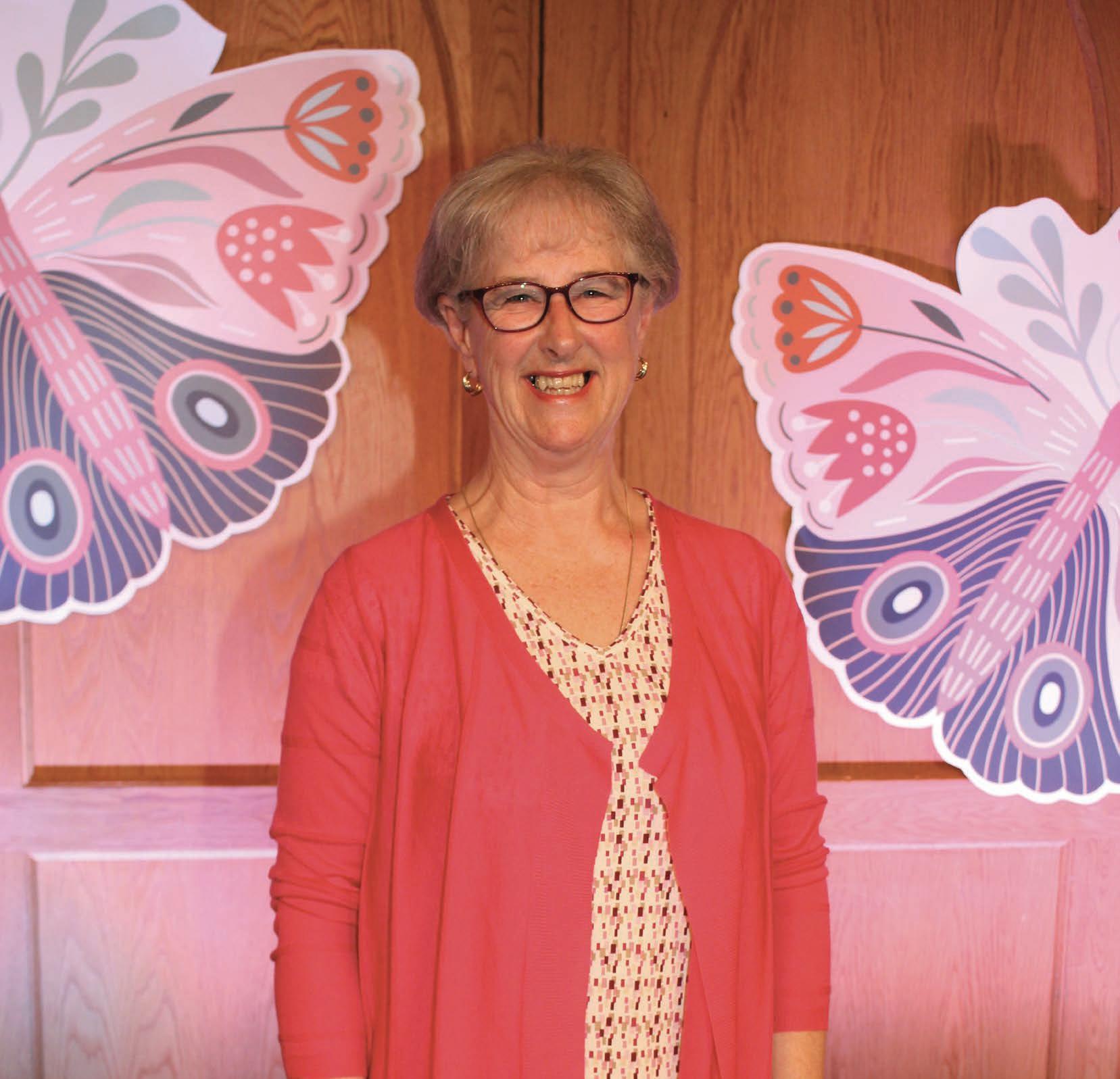
Ann, as we are featuring you in our Autumn edition of Wider World, here are some quickfire questions to get to know your preferences as we enter this new season.
Apple pie or toffee apples?
Apple Pie – heated slightly and preferably with fresh cream!
Cinema or Netflix?
Cinema although I must confess that my husband Alan and I don’t go very often, mainly because we don’t keep up-to-date with what’s on. The last film we saw was Super Mario Bros which we took our two young grandchildren to see.
Shopping in person or ordering online?
I prefer shopping for groceries and clothes in person but I do order other items online, usually ones that are less easily available locally.
Walk on a pumpkin patch or kicking leaves in a forest park? Kicking leaves in a forest park.
Road trip in Ireland or European city break?
Road trips in Ireland were my childhood holidays, so now I will choose a European city break. There are a few cities I would really like to visit and perhaps I will get to them.
Now, let’s get down to some bigger questions about your faith and transformation as a Christian over the years.
Who would you say is/has been a role model to you in your faith?
I would have to say that, on looking back, my dad played an important part in that. He didn’t speak loudly about his faith but showed it in how he lived – how he treated people, what he did for them. There have been various others along the way from leaders in the Holywood Girl Crusaders to leaders of my school’s Scripture Union group. In more recent years, role models have been members of church home groups that I have been part of.
What is your favourite Bible verse/passage and why?
That is a difficult question – it’s really hard to choose just one in particular. I love so many of the Psalms and turn to them often. Having said that, Isaiah 41:10: “Fear not, for I am with you; be not dismayed, for I am your God; I will strengthen you, I will help you, I will uphold you with my righteous right hand” is a verse that comes to me when I need to be reminded that I’m not on my own and don’t have to rely on my own strength as we’re often prone to do!
What experiences do you feel God has used in your life to shape you into who you are today and who you are becoming in Christ?
I don’t think I can pinpoint any specific experiences although I’m sure there have been many throughout the years. Obviously, my mum and dad and my upbringing had a lot to do with it. They always led by example as they encouraged me to be involved in church life in many different ways and I know that it was God guiding me every step of the way and preparing me for what he had planned for me in later life.
Often, it’s only on looking back and piecing together the various disappointments, times of waiting and small successes that you realise it was God’s way of affirming the verse from Romans 8:28: “And we know that in all things God works for the good of those who love him, who have been called according to his purpose.”
Was there a specific time of transformation in your life?
I grew up in the church within a Christian family and had been brought up to love and trust Jesus. Then, in my mid-teens, I, with others from my school’s Scripture Union, attended a live broadcast in the Grosvenor Hall, Belfast, of one of Billy Graham’s UK rallies. I remember the atmosphere was amazing, along with the feeling of God’s presence. I went to the front that night, not as a new convert but to reaffirm publicly the faith I already had.
What is your hope for Presbyterian Women as you take on the role of President in 2023 into 2024?
Well, the theme for this year is Being Transformed and as I have been thinking about it, the words of a children’s song which I taught in school assemblies and Sunday School keep going round in my head. The last verse and chorus go like this:-
“Dear Jesus, please make us more patient and kind; and help us to be more like you, and make room for all other children of yours, for they are still growing up, too. Kids under construction; maybe the paint is still wet Kids under construction, the Lord might not be finished yet.”
My hope is that, as Presbyterian Women and children of God, we all grasp the fact that Being Transformed is a life long journey, an ongoing process which should lead us to becoming more like Christ in everything we do. Our transformation doesn’t happen overnight or with a click of our fingers but as we continue growing in our knowledge of God, listening to him and following the path he has already laid out for us.
How can we prayerfully support you in the year ahead? I would value prayer greatly.
Pray that as I meet and speak to various people and groups, I would do so with humility and graciousness.
Pray that I would rely totally on God for his guidance and help in every situation as I’m sure I will be taken well out of my comfort zone on many occasions.
Pray that I will give encouragement to others as we all focus on what it means to be transformed in Christ and how we can follow the words of our key verse found in Romans 12:2.
We will indeed be praying for you, Ann. Thanks for sharing part of your story for our readers to get to know you better and God’s richest blessings to you in your year as PW President.

Prayer is as necessary to the Christian as breathing is to the human body – but it often doesn’t come quite as naturally.
AndrewDickson, PCI’s Congregational Life Development Officer, explores corporate prayer as a central practice in the life of the local church.

Prayer saturated Jesus’ life and ministry. Like many first century Jews, Jesus would have grown up reciting the Shema (Deuteronomy 6:4-9) in the morning and evening. He would have regularly prayed in his local synagogue. When the time came for him to begin his ministry, we observe Jesus praying at his baptism in the Jordan River (Luke 3:21). Before choosing the 12 disciples from among his growing crowd of followers, Jesus retreated to a mountainside to spend the whole night in prayer (Luke 6:12-16). He prayed after healing a leper (Luke 5:16), before feeding the 5,000 (Matthew 14:19), and for the protection of his disciples and the unity of all believers (John 17). And in his final moments, in both the Garden of Gethsemane (Mark 14:32-40) and upon the cross (Luke 23:46), Jesus prayed to his Father.
In one of the most familiar passages of Scripture, Luke 11:1 tells us that, after observing Jesus praying, one of the disciples approached him and said, ‘Lord, teach us to pray’.
Nowhere else in the gospels do the disciples ask Jesus to teach them how to do something. How does Jesus respond to their request? Without hesitation, he opens his mouth and begins to pray:

“Father, hallowed be your name. Your kingdom come. Give us each day our daily bread, and forgive us our sins, for we ourselves forgive everyone who is indebted to us And lead us not into temptation.” (Luke 11:2-4).
In just a few stanzas, Jesus teaches his disciples how to pray, what to pray for, and who they are to pray to. But I wonder if you notice something else as you read through the words of the Lord’s Prayer? I wonder can you see all the plurals (italicized) that Jesus uses? While the disciples approach Jesus likely wanting to know how they can pray like him individually, Jesus responds instead by teaching them how to pray together. Jesus’ choice of words like us, our and we show us that praying together is not optional for the church – it is essential.
It seems obvious to say that regular corporate prayer ought to be an essential part of the life of every believer and every local church.
Whether in the Sunday service, your women’s ministry meeting or the corporate prayer meeting, the opportunity to pray prayers of adoration and thanksgiving alongside our brothers and sisters provides us with the space to slow down and linger on the glories of God, his attributes and his character. Prayers of confession allow members to study their own hearts, confess their sins before God and hear an assurance of forgiveness. To publicly pray prayers of intercession reminds us that we’re not in control and that we need God to do what only he can do: save the lost, feed the hungry, liberate captives, give wisdom to world leaders, fix broken institutions and sustain persecuted Christians.
The glory of God, the history of the church and the encouragement of believers mandate that we take prayer as seriously as other elements of corporate worship, like singing and preaching. Where prayer is present, it’s saying to the church that we really need the Lord. When we gather to pray together, we encourage one another by our faith, we teach one another by our theology and example, we love one another by our concern, and we point one another to the God who tenderly receives the cries of his beloved children.
Whether in the Sunday service, your women’s ministry meetings or the corporate prayer meeting, the opportunity to pray prayers of adoration and thanksgiving alongside our brothers and sisters provides us with the space to slow down and linger on the glories of God, his attributes and his character.
Here are three guiding principles to keep in mind as you find your voice in prayer.
Throughout the gospels, Jesus regularly retreated at specific times and to specific places to pray (Matthew 14:23; Mark 1:35; Luke 5:16).
When will you pray? First thing in the morning? Last thing at night? On your daily commute? During your lunch break? When the kids are napping? As a general rule, you should give God your best time of day when you’re most awake and aware.
Where will you pray? You can pray anywhere! A loft. A garden. A spare room. A park bench. Wherever you decide, it’s important that you find a place away from the constant noise of modern life –somewhere you can be still and know God (Psalm 46:10).
How long should you pray for? 1, 5, 10, 15, 30 minutes? There’s no “right” answer here. Simply start where you are, not where you feel you should be. Do you struggle to pray? Try praying for one minute to begin with. Increase this time as you become more confident and comfortable. If you consistently pray each day, consider increasing your prayer time by five minutes.
Making prayer enjoyable Your daily prayer time should be something to enjoy, not endure. Make yourself tea or coffee. Savour the quiet, or listen to some worship music. Go outside. Pray while walking or whilst doing some other kind of activity.
All kinds of insecurities can hinder our individual and corporate prayer lives: “I’m not an expert. I’m not eloquent. I’m not confident. I could never pray like them.”
Reassuringly, God knows that we don’t find it easy to string a sentence together in his presence or in the presence of others. He remembers, “that we are dust.” (Psalm 103:14). He understands that we sometimes get tongue-tied, distracted and confused.
God isn’t looking for polished or perfect prayers. Instead, he simply wants to spend time with you. He wants to hear your voice telling him about all the details of your life. You don’t need to try to sound more holy or pure or spiritual than you are. Just pray as you can, and don’t try to pray as you can’t.
If you are able, try praying aloud for one minute. If you find praying aloud difficult, try journaling prayers with paper and pen instead.
The Bible is a precious foundation for finding your voice in prayer. When you come to pray, put God’s living and active words into your ears. Let them shape and inspire the vocabulary of your prayers:
Show me your glory (Exodus 33:18).
The Lord is my rock, my fortress, my deliverer, my shield, and my salvation (Psalm 18:2).
Turn my eyes from worthless things (Psalm 119:37).
Let no sin rule over me (Psalm 119:133). Come, Lord Jesus (Revelation 22:20).
What kind of words spring to mind when you think about God? Loving, kind, compassionate, patient, faithful, helper, friend, mighty, strong, powerful, everlasting. Something else?
Our prayers of adoration should look to the Bible and lead us to praise God for who God is. Adopting a tone of affectionate wonder, prayers of adoration should reflect the beauty of God’s character. God is infinitely worthy of captivated hearts overflowing in passionate praise.
Give it a go
Pick up your Bible, turn to Psalm 23, and do the following:
Days 1-3: Read, meditate on, and memorise Psalm 23.
Day 4: Use Psalm 23 to write a personal prayer of adoration to God. Use “I” in your prayer.
Day 5: Write a corporate prayer of adoration based on Psalm 23. Use “we.”
The next time your church has a corporate prayer meeting, why not take your prepared prayer along and read it aloud alongside your fellow pray-ers?
Sin is serious. It’s something we’re all guilty of (Romans 3:23). And even though we have been born again and become new creations in Christ, there is no shortage of things we can say sorry to God for every day.
Praying a prayer of confession publicly as a congregation each week adds integrity to our worship. It also allows people to “come clean” with God (Psalm 51:1-2), to receive afresh the assurance of his wondrous love and forgiveness (Psalm 130:7-8), that we might get on with growing in love for him and others (Colossians 3:12-13).
Confession should aim at grateful sorrow as we contemplate the horror of dishonouring God and the staggering riches of his forgiveness in Christ.
Corporate confession should always be followed by an assurance of God’s forgiveness flowing from the work of Jesus on the cross and his resurrection. Doing this, by using a passage such as 1 John 1:8-9, leads us back to God’s grace, turning our sorrow of confession into the joy of forgiveness.
Give
Pick up your Bible, turn to Jesus’ letters to the churches in Revelation chapters 2-3, and do the following:
Days 1-3: Read and meditate on Revelation chapters 2-3.
Day 4: Write out five bullet points for a corporate prayer of confession.
Day 5: After each specific point of confession, insert a repeated refrain such as, “Lord, forgive our sins and cleanse our hearts.”
Days 6-7: Practise praying it aloud until it feels natural and fluent.
God is kind to his children in so many ways. He has created us, cares for us, provides for us, is patient with us, loves us, forgives us, and has adopted us into his family as sons and daughters. The list could go on.
Our prayers of thanksgiving should be thoughtful, humble, and full of joyful gratitude as we count our blessings and remember that, thanks to God, we have it better than we deserve. This type of prayer ought to be a vital element within our corporate worship services and prayer meetings as we respond to all the works God has done, is doing, and will do in our lives.
Give it a go
Take five minutes tonight, before you go to bed, to play back the events of your day like a movie and thank God for every good thing you encountered or experienced:
- The first sip of tea or coffee that morning
- Moments of laughter with loved ones
- An insightful conversation with a colleague
- The progress made on a big project
- The food you’ve eaten
- The moments you sensed God’s presence closest
This is the relatively easy part, right? Prayers of supplication – or intercession – are the prayers we pray most naturally and frequently, both personally and corporately.
Yet we must be careful. It’s important to ensure that our prayers asking for God’s help are balanced with adoration, confession and thanksgiving. This will keep us from only praying the “grocery list” of all our own needs.
When we ask for God’s help for ourselves and others in the world today, the mood of our prayer should be urgent confidence. We pray urgently (Luke 18:1-8) because we are dependent on God to protect us, provide for us, and sustain us every day. And we pray confidently because, in Christ, our loving heavenly Father promises to supply all our needs (Philippians 4:19).
Let’s pray
Prayer is a big deal. It’s vital for us both as individuals and for the life of our churches. Prayer is for the mature believers and the newly reborn. It’s for all those whose sins are big and whose Saviour is bigger. It’s for the mechanic and the academic. There is an important place in this work for the ill, the weak, the young, the old, the tired, and the strong.
All who belong to Jesus, come and join in. Come together to this great privilege, this heavenly gathering, this means of grace, this vital task. Come, brothers and sisters, let’s pray.
We catch up with PCI’s two trainee deaconesses to see how their placements and college studies are going as Heather Healy and Cathy Smith enter their final year of training.
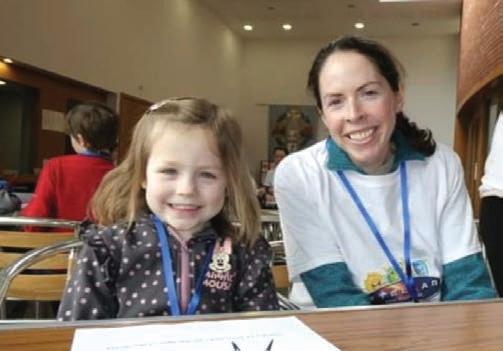
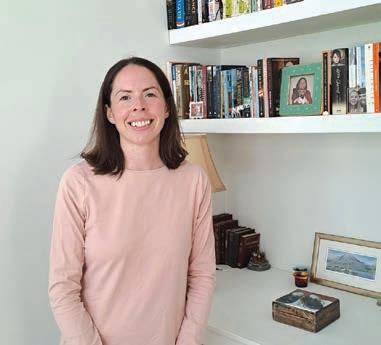
The gladness that filled my heart when I was accepted for deaconess training was something I will never forget and that strong confirmation of the call upon my life continues to give me encouragement and strength especially on those more challenging days! As Elisabeth Elliot wrote:* “God’s will is always bigger than we think, often more difficult and more glorious”. Thank you to Presbyterian Women and to the ladies in various congregations who remember me in their prayers.
Training for deaconess service has taken me to different parts of Northern Ireland and I have gained much by experiencing the breadth of style and tradition within our Presbyterian family.
I have had opportunities to serve the Lord in various contexts which has increased my understanding of the work of a deaconess and the wider church. In my first year, I was part of a large and intergenerational community of believers at Wellington Presbyterian in Ballymena. I enjoyed getting to know members of the congregation in their eighties and nineties whose love and passion for Jesus Christ was as vibrant and alive as when they first came to faith in childhood. They continue to serve faithfully, and I have been encouraged by them and learned much from their witness as I observed the legacy of faith being passed from one generation to the next.
It is a privilege to meet many people at all ages and stages of life and hear their story. I am ever more conscious of my dependency upon the Lord and the need for a prayerful and humble spirit as people share their lives with me. It is essential that my awareness of God’s love for the world and his compassion and grace towards me is what shapes my response to others.
Each week, I also attend classes at Union Theological College in Belfast. I enjoy my studies and it has been good to get to know the other students in the college community. There is a supportive and encouraging environment which has enabled me to learn, understand and grow in my ministry knowledge and skills. I have spent my second year of training serving in Dunmurry Presbyterian on the outskirts of Belfast.
Dunmurry is an area that has seen significant demographic change over the years, and it has been great to be involved in outreach into that community through various initiatives. The Easter holiday Bible club was very well attended and it was brilliant to be involved each day. During the month of June, I led a Hope Explored course and this was an opportunity for people to come together to explore, discuss and discover more about the real hope that the Christian faith offers.
Being involved in many aspects of church life at Dunmurry has been very enriching.
I am thankful to God for the lessons I have learned and the invaluable experiences gained through extensive involvement in pastoral ministry, leading services, preaching, as well as children’s work and youth ministry.
I look forward to my third year of training and getting to know the congregation of Muckamore Presbyterian where I will spend my final congregational placement. My prayer is that I would continue to grow in my knowledge and love for Jesus Christ and make him known to those around me. He alone is worthy of my love, trust and service.
I am ever more conscious of my dependency upon the Lord and the need for a prayerful and humble spirit as people share their lives with me.
Heather Healy
Recently I have just completed my second year of studies for deaconess training at Union Theological College and will finish my second year placement in Islandmagee Presbyterian in August.

Union College is a place I feel very privileged to attend and learn, although I find the academic side of my training challenging.
At the end of the most recent semester, I attended a variety of classes in pastoral care over a two-week period. This was alongside Heather, the ministry students, and participants from a range of Presbyterian congregations.
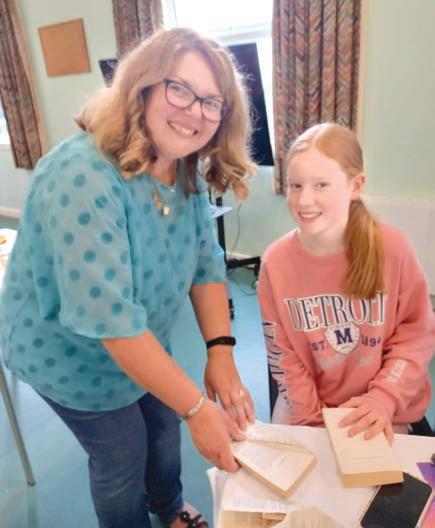
I found these a helpful aspect of my training, preparing me for situations which may arise while I am on placement or in the future when I become a deaconess. I was concerned about driving along the country roads, with no footpaths or streetlights. Thankfully my driving confidence has grown.
During my time in Islandmagee, I have been privileged to be part of the Presbyterian Women Group. Around 35-40 ladies attend the monthly meetings. From the beginning of my placement, I was encouraged to join the planning of activities.
Under guidance and with help and encouragement I led the February meeting which included morning coffee, craft, and a short talk. I took the theme of ‘Love’ and along with the ladies explored the story of Ruth. We looked closer at the love Ruth showed for her mother-in-law Naomi and reflected on Ruth 1:16: “Where you go I will go, and where you stay I will stay. Your people will be my people and your God my God.” Not all the ladies felt that they were able to make the craft, but with a little persuasion all the ladies tried book folding, and a normal book was made into the word LOVE.
As well as Presbyterian Women, I have been involved in Girls’ Brigade, Messy Church, the monthly church family prayer meeting, and a monthly ladies’ Bible study. I have enjoyed attending the prayer meeting and Bible study and valued the opportunity to lead these gatherings on several occasions.
Rev Peter Bovill has encouraged me to participate in Sunday morning services both praying and reading. Over time, and as my confidence has grown, I have had opportunities to both lead services and do a children’s talk. In November, I helped with a special bereavement service for people who had lost a loved one over the Covid-19 period. These opportunities have challenged me and during these times I have totally relied on God.
A lot of my time while on placement has been visiting people in nursing homes, hospitals, or their own family homes.
I have been made so welcome by everyone in the congregation and it is a privilege to be invited into someone’s home.
I am going to miss being in Islandmagee Presbyterian and working alongside the Rev Peter Bovill and Katherine Dickson the youth worker.
My third year begins in September, and I will be joining 1st Holywood Presbyterian for my final year placement.
I am excited and looking forward to this new opportunity. It always amazes me to reflect and consider how God has brought me through so many different circumstances. From the beginning of my journey in deaconess training, I held onto the verse: “I can do all things through Christ who strengthens me” Philippians 4:13.
This is the promise that I will also be holding onto in my final year of training, from our God who is so faithful, even though we are so undeserving.
I am excited and looking forward to this new opportunity. It always amazes me to reflect and consider how God has brought me through so many different circumstances.
Cathy Smith

Rick Hill, Mission in Ireland Council Secretary, answers some FAQs from congregations considering adding a deaconess to their ministry team.
How will a deaconess be different from any other ministry team member we
While in the Presbyterian Church in Ireland the diaconate is currently a female office, this does not restrict them to women’s ministry. Deaconesses work in evangelism, youth ministry, family ministry, marriage preparation, training, counselling, Bible teaching, Alpha or Christianity Explored courses, group leadership, community engagement, prayer ministry, pastoral work in hospitals, meeting with elderly members, pastoral crisis response and more. The key is that each congregation works with the Council of Mission in Ireland to tailor the role to suit their needs.
Multiplication or addition?
Having another ministry team member can be a real benefit to a minister and kirk session. However, a deaconess can do more than just relieve the immediate pressure of congregational busyness.

They can multiply, as well as add to, the capacity of the church by spreading the vision of new possibilities for Christian service. By training new volunteers, and investing in their development, a deaconess can significantly increase the numbers of people engaged in the outreach and ministry of the church.
How do we finance this important ministry?
The financial arrangements for a deaconess are agreed with each congregation in advance of her employment. Deaconesses (like any other member of the ministry team) receive a salary that is based on a proportion of the ministerial stipend and increases with experience. Increasing a ministry team is a major financial commitment for a congregation, but we believe deaconesses come with a sense of God’s call, excellent training, and specialist knowledge of the Presbyterian Church in Ireland.
As Heather and Cathy enter their final year of training at Union Theological College, ten students, including two women, Christine Craig and Karen Jardine, will begin their studies for ordained ministry within the Presbyterian Church in Ireland. Let us remember to faithfully pray for all those in training.
Here are some points to use in your prayer time:
- Thank God for those that feel called and supported to commit to training for ministry as deaconesses and as ministers.
- Pray for first year students as they adapt to being students again after working in various capacities. Pray they continue to know God’s calling and leading in their lives.
- Pray for all students after the summer break that they will settle into campus life and juggle the demands of study, reading and assignments with family responsibilities.
- Pray for the lecturers and professors and staff at Union College for stamina, wisdom and patience with the students.
- Pray for the Council for Training in Ministry as they seek to encourage more people to consider applying to be candidates for the ministry. Pray particularly for the new Convener, Rev Andrew Faulkner in this demanding role.
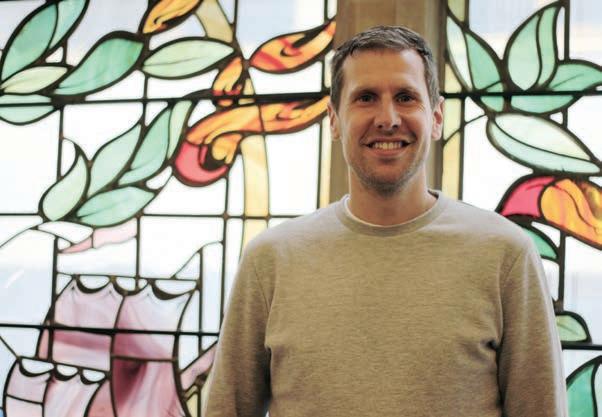
Give me a deeper trust, that I may lose myself to find myself in thee, the ground of my rest, the spring of my being. Give me a deeper knowledge of thyself as Saviour, Master, Lord, and King. Give me deeper power in private prayer, more sweetness in thy Word, more steadfast grip on its truth. Give me deeper holiness in speech, thought, action, and let me not seek moral virtue apart from thee. Plough deep in me, great Lord, heavenly husbandman, that my being may be a tilled field, the roots of grace spreading far and wide, until thou alone art seen in me, Thy beauty golden like summer harvest, thy fruitfulness as autumn plenty.
Words from a Puritan prayer
Photography credit: Olivie Strauss


Valerie Murphy helps us to press pause and consider the process of transformation looking deeper at the story of Jesus’ transfiguration in the gospel of Matthew.


After six days Jesus took with him Peter, James and John the brother of James, and led them up a high mountain by themselves. There he was transfigured before them. His face shone like the sun, and his clothes became as white as the light. Matthew 17:1-2
It is remarkable that nowhere in the four gospels does it tell us what Jesus actually looked like. The only clue we get is from Isaiah’s prophecy when he tells us,
“He had no beauty or majesty to attract us to him, nothing in his appearance that we should desire him (Isaiah 53:2). In human terms, the son of God was unremarkable, an ordinary man.
So, I wonder if Peter, James and John had any idea what was ahead of them as they climbed up the high mountain with Jesus, away from the rest of the disciples and the needs of the crowds who followed them everywhere they went. As they stopped to catch their breath, taking in the view, Jesus was transformed before them. His face shone like the blazing sun and his clothes were gleaming white, “as no-one on earth could bleach them” (Mark 9:3).
Peter wants to hold on to the moment, but as he speaks the glory cloud of God’s presence envelopes them all and God speaks.
“This is my Son, whom I love; with him I am well pleased. Listen to him!” Matthew 17:5
These words were not new. As Jesus stood dripping wet in the Jordan River after his baptism, the heavens had opened, and God had broken his silence and confirmed his identity as his much-loved son (Matthew 3:17). But now on this high mountain, transformed and glorious, there was no doubt as to who Jesus was. Later as Peter reflected on this event he said, “we were eyewitnesses of his majesty” (2 Peter 1:16-18).
So what has this episode in the life of Jesus and his disciples got to do with us and our transformation? As we reflect on being transformed, how does this story inform our thinking?
John, who saw Jesus transfigured and heard God affirm him, would later write these amazing words in his first letter:
See what great love the Father has lavished on us, that we should be called children of God! And that is what we are! The reason the world does not know us is that it did not know him. Dear friends, now we are children of God, and what we will be has not yet been made known. But we know that when Christ appears, we shall be like him, for we shall see him as he is. All who have this hope in him purify themselves, just as he is pure.
1 John 3:1-3Let’s take these three verses from 1 John one at a time.
3:1 We have already been transformed
Just as Jesus was declared to be God’s much loved son, so we too are now children of God as a direct result of God’s love having been lavished on us. We were not born this way. This transformation took place when we received Christ as the one to save us from our sins, and when we believed in his name (John 1:12). In that moment, we were adopted into God’s family, and became equal heirs with Christ (Romans 8:15-17). Our identity and our future changed forever.
Yet on the outside we look the same. There is nothing visible to identify us as God’s children and so the world does not recognise us for who we are. We, like Jesus, live out our days in ordinariness, but this will not always be the case.
Look up the following verses and note the transformation that has already taken place as a result of you coming to Jesus for salvation. Ephesians 2:1-10; Colossians 1:13-14, 21-22.
Thank your Father in heaven for the work he has already done in you, and ask him to remind you daily of your true transformed identity as his “lavishly loved” child.
3:2 We will be transformed
John now takes us forward to that moment when Christ appears and he writes, “when we see him, we will be like him!” In that future moment when Christ returns and we see him face to face, we will be changed. Paul states the same truth this way: “when Christ who is our life appears, we will appear with him ‘glorious’” (Colossians 3:4).
If this seems too impossible, listen to how Paul, who is sitting imprisoned and confined as he writes, describes this moment for us:
But our citizenship is in heaven. And we eagerly await a Saviour from there, the Lord Jesus Christ, who, by the power that enables him to bring everything under his control, will transform our lowly bodies so that they will be like his glorious body.
Philippians 3:20-21The glory of Jesus transfigured on the high mountain is a foretaste of the future for each one of us who are born again and who are now beloved children of the same Father. Our true identity will be revealed as our bodies are finally redeemed and we are transformed. This is our certain future and our confident hope, despite the circumstances that envelope us in the in-between.
What impact does this staggering truth have on you as you reflect on it just now? In what ways does it reveal the kindness and Father heart of God?
Read Romans 8:18 and 2 Corinthians 4:16-18. How does this promise of future glory help us in times of suffering and distress?
If our past and future transformation is taken care of, how do we live in the in-between?
3:3 We are being transformed
John tells us that understanding this hope found in Christ, and living in the confident expectation of our future transformation, changes us. It leads to us choosing to be pure, setting our hearts and minds to please God, following Jesus’ example. We live out our lives wanting to become more like him, the goal of all true transformation, past, present and future.
Read Romans 12:2 and 2 Corinthians 3:17-18. What are some of the ways these verses can help us to become more like Jesus as we are being transformed?
When in heaven I see thy glory; When before thy throne I bow. Perfected I shall be like thee; Fully thy redemption know. My redeemer, Then shall hear me shout his praise. Anonymous
Hillhall Presbyterian’s Women’s ministry group goes under the name of Helping Hands. We’re delighted their group has taken the time to tell us more about what they do when they meet together, in particular to help and love people overseas.
Hospitality forms a big part of our women’s ministry in Hillhall. On the last Monday of the month, we enjoy fellowship with each other but we are also keen to extend this to people beyond our boundaries in Hillhall.
Helping Hands started more than twenty five years ago with five women and has grown to more than fifty - the youngest of whom is eight year old Zoe. Today women come not only from the congregation of Hillhall, but from the surrounding area of Lisburn.
The ministry of Helping Hands has blessed countries such as Nepal, India, Ukraine and Uganda with everything from crocheted blankets, hats and teddy-bears for HIV diagnosed babies abandoned at birth in Malawi. We also make garments for babies who have been abandoned by their mothers in these countries. Known as ‘fish and chip’ babies, they would be found on the streets wrapped only in newspaper. We make twiddle muffs for the elderly in local nursing homes who suffer from dementia. Another priority is supporting Samaritan’s Purse’s mission to provide aid to victims of war, disease, disaster, poverty, famine and persecution.
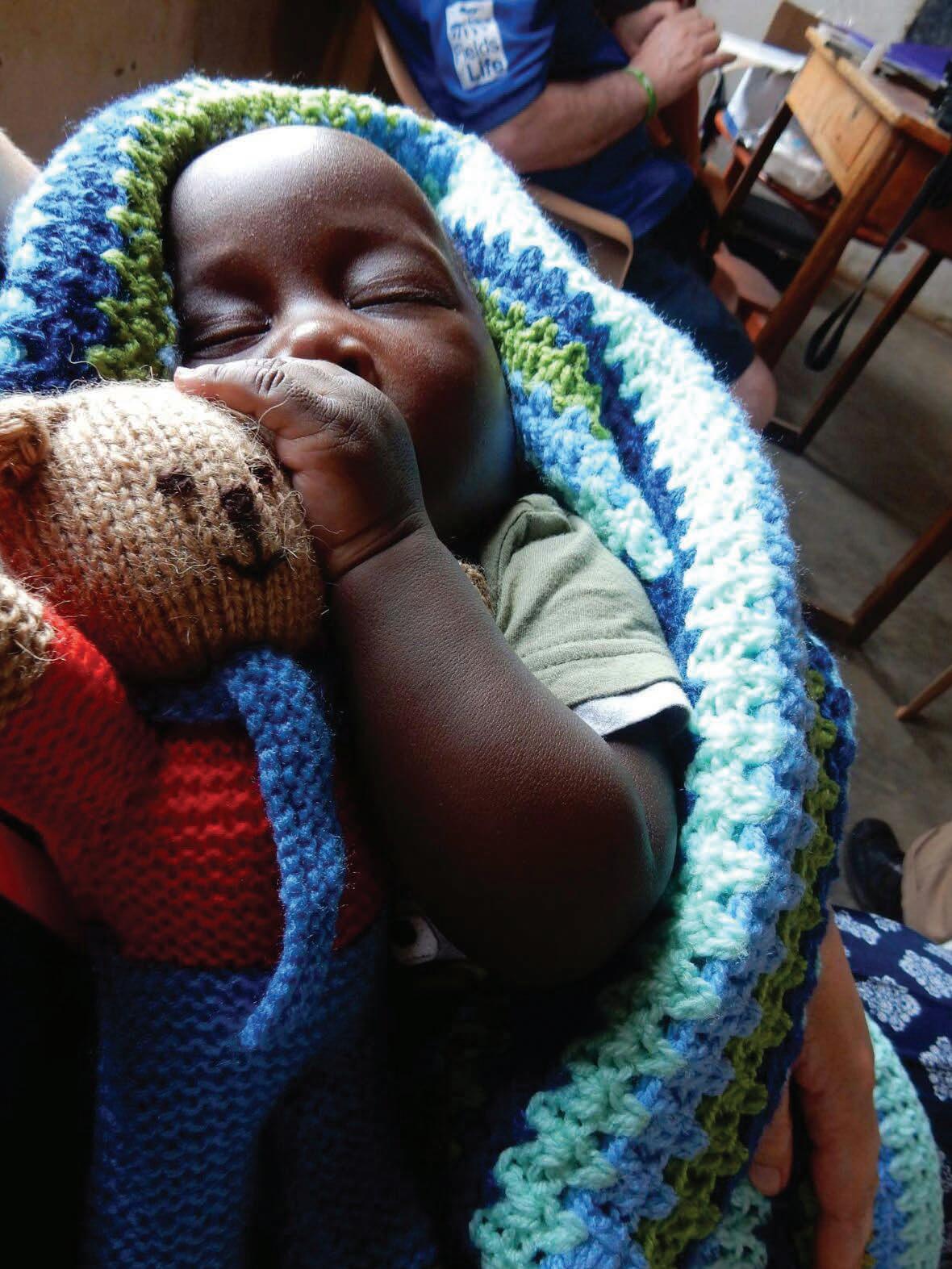
Together we use our talents to bless others and to reflect the love and compassion of Jesus.
One of the women shared that just as Dorcas in the Bible was known for her compassion for the needy in the community, so too are we, through Helping Hands at Hillhall, using our gifts and skills to invest in those who are in need.
At local and grassroot levels, Helping Hands ministry reaches out to meet the practical needs of the hospital neonatal wards; the International Meeting Point in Carlisle Circus; Mission to Seafarers Belfast and people with dementia through their quality and quantity of baby clothes, hats, and twiddle muffs that are supplied specifically to nursing homes.
Even when contending in difficult times like bereavement, the group finds solace and strength in the depth of friendships formed through a ministry that enables us to flourish together.
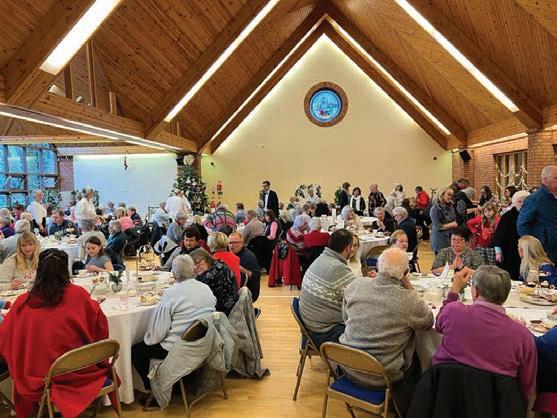
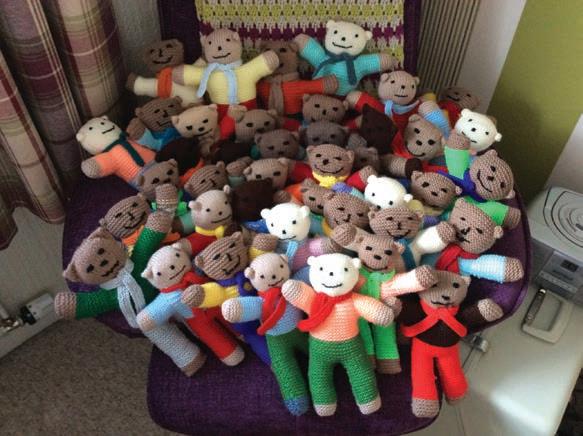
An elder who more recently became involved, gave the insight that crocheting and knitting reminded her of life experiences gained from times when we are struggling to make the right choices, and we have to ask for help before deciding which advice is best for what to do next. In the same way, she said, when learning a new pattern that doesn’t work out, there are many times it has to be pulled apart and necessary help requested before redoing and finishing it. In Helping Hands she sees the much needed loyal love, encouragement and support from, and for, each other in those times when they are too overwhelmed to overcome challenges by themselves.
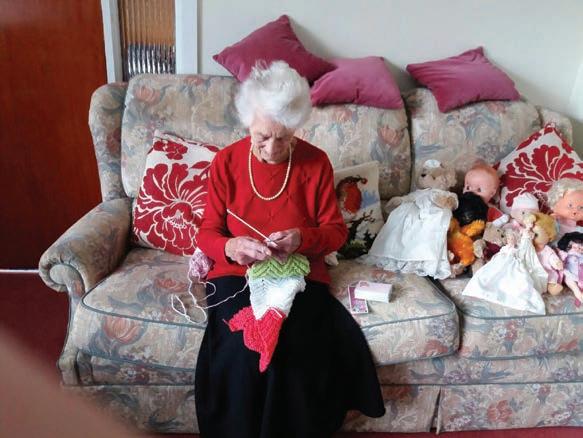
One of the events we enjoy reaching out to our local community with is our much loved ‘Victorian Tea’ hosted annually by Helping Hands in November. It’s a good way to socialise and engage and get to know others. We all dress up in period costume and, of course, bring the best china out. Of vital significance to the hundreds who attend is that proceeds of this, as well the ‘Big Breakfast’, goes to the Cancer Fund for Children.

In our relationships within the group, that have grown and continue to grow, we wish to love, learn and flourish together as women.
We particularly want to etch godly wisdom into the hearts and minds of our younger generations so they can be a blessing in the community and to others further afield.
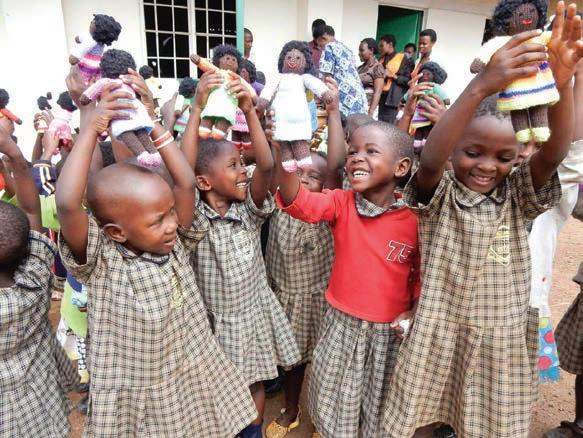
We enjoy being together - whether that’s around a seaside themed table with fish and chips on the menu in the church hall or on a bus trip to Cookstown like we did in May or at a monthly evening supper. Yet despite knowing that we will never cross paths with the benefactors of Helping Hands ministry to receive any sense of recognition or reward, we seek that our Father in heaven is glorified (Matthew 5:16).
The ministry of Helping Hands can be summed up by these verses in Philippians 2:1-4: “Therefore if you have any encouragement from being united with Christ, if any comfort from his love, if any common sharing in the Spirit, if any tenderness and compassion, then make my joy complete by being like-minded, having the same love, being one in spirit and of one mind. Do nothing out of selfish ambition or vain conceit. Rather, in humility value others above yourselves, not looking to your own interests but each of you to the interests of the others.”
We particularly want to etch godly wisdom into the hearts and minds of our younger generations so they can be a blessing in the community and to others further afield.
Lisa Skinner, co-owner of Order in the House, a decluttering and professional organising company in Northern Ireland, and an elder in Kirkpatrick Memorial Presbyterian Church, outlines the physical, mental and spiritual benefits of transforming our homes and possessions.
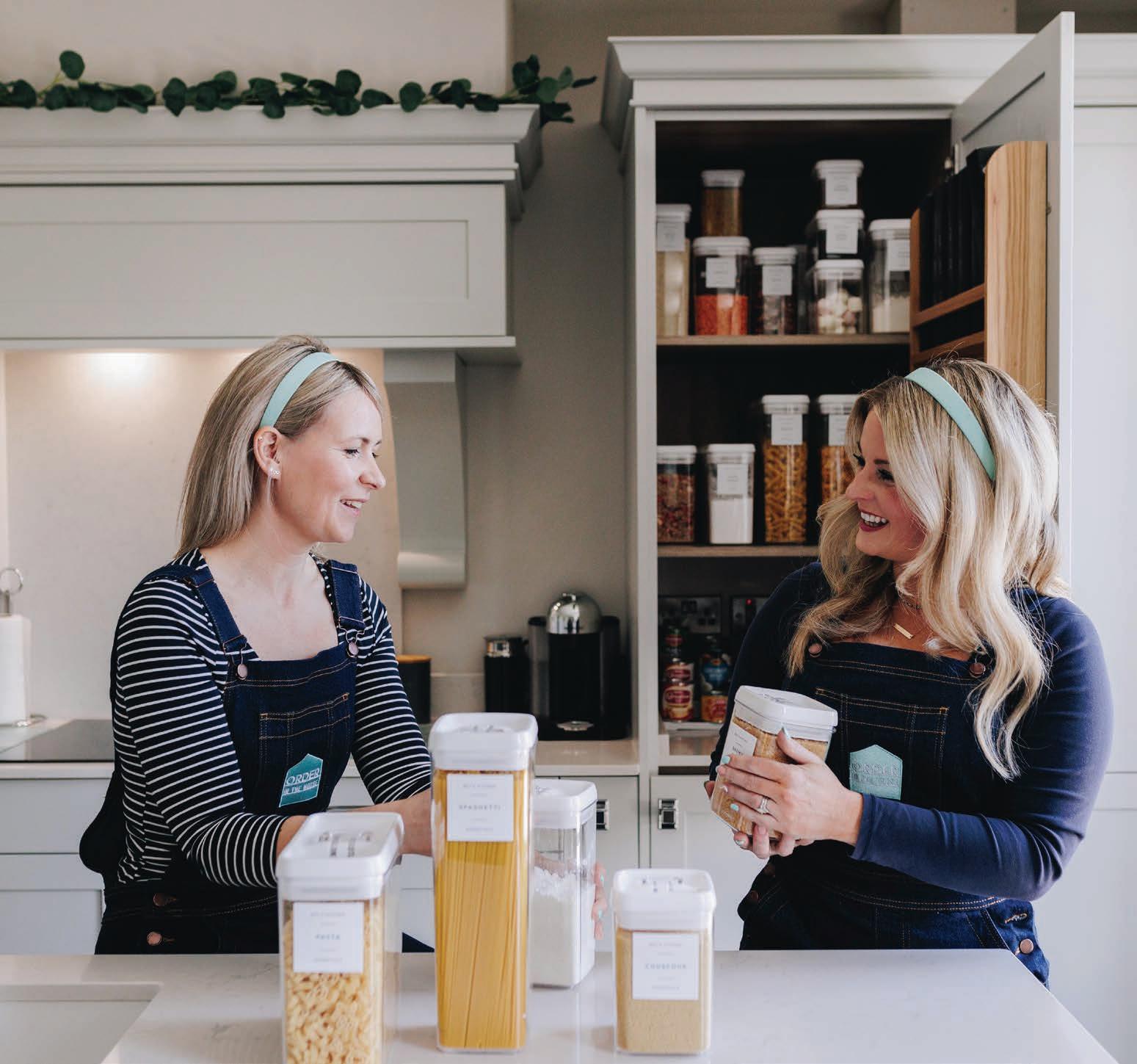
wonder how the state of your home makes you feel. If you’re anything like me your surroundings may induce pangs of anxiety. I am very aware that the state of my home significantly affects me, my mood, my emotional and even my spiritual wellbeing. It’s not something I’m proud of, but I know I’m not alone in feeling this way. This is one of the reasons that my friend Claire and I decided to start Order in the House back in 2021. As professional organisers, we spend a good part of our week helping people declutter their lives of all that is unnecessary, and transform their spaces by replacing chaos with order. We do this because we believe order is good.
Deep down I think we all crave order in our lives. The reason this desire for order is innate to all of us stems from the Genesis story - God takes the disorder and darkness described in the second sentence of the Bible and brings out of it order and beauty and goodness, and in doing so he makes a world where life can flourish. As God began to move in his week of creation, he formed and then he filled, there was a natural order to all things and he said, “it is good”.
In Genesis, we also learn that we are made in the image of this God who loves order and beauty, this is part of who we are. That’s not to say that organising comes naturally to all of us - it doesn’t - but it’s certainly something we can enjoy, and it can help us to flourish in our lives.
Our physical environment has a direct influence on our emotional, mental, and spiritual state. Research has found that those who describe their surroundings as cluttered experience higher levels of cortisol (the stress hormone) in their bodies throughout the day. Chaos and disorder can lead to stress, distraction, and a lack of focus on what truly matters. The order that we need to flourish can only be achieved through the means of decluttering, a serene and orderly home can create an atmosphere that is conducive to prayer, meditation, and spiritual growth.
As Christians, we believe that everything we have, including our homes, are a gift from God. We are called to be good stewards of these gifts, which means taking care of our homes and maintaining them in a way that reflects our gratitude and respect for God’s provision.
Nowhere in the Bible does it say that we must have perfect homes, but it does talk a lot about our ‘stuff’. Jesus spoke in Matthew 6:19-21:
“Do not lay up for yourselves treasures on earth, where moth and rust destroy and where thieves break in and steal, but lay up for yourselves treasures in heaven, where neither moth nor rust destroys and where thieves do not break in and steal. For where your treasure is, there your heart will be also.”
Our earthly possessions should not be our ultimate treasure. We come into the world with nothing, and we leave with nothing but in the interim we have some resources at our disposal, and we will have to account for what we did with those resources.
The ‘stuff’ we have can’t make us happy. The Bible contains examples of those who put possessions above their service to God (Acts 5:1-11; Mark 10:17-22). In our Western world, if we’re honest with ourselves, we all have too much, but life doesn’t consist in an abundance of possessions. Life is not measured against what we have but rather whose we are, a true appreciation of that truth frees us from the bonds of stuff.
Hebrews 12 says, “Let us throw off everything that hinders and the sin that so easily entangles.” The things we have can consume our time and our priorities and therefore hinder us in life.
Transforming a chaotic home into a serene space is not an easy thing to do. It involves letting go of unnecessary possessions and material attachments. Streamlining and simplifying our living spaces can free us from the burden of excessive materialism and allow us to focus on what truly matters.
In the course of our work, we’ve found that shedding possessions can lead to more time for family and friends, more money and more energy. When we declutter it often causes us to re-evaluate how we consume and accumulate - as a result our spending habits change. So, a transformed home can not only lead to a transformed mood but a transformed mindset around how we consume and what’s important in life.
When we prioritise decluttering and the organisation of our homes, we can turn these tasks into acts of gratitude and worship. Recognising God’s presence in our homes and lives can lead to a deeper appreciation for his blessings.
There are many who struggle with hoarding tendencies. These people often go unnoticed and unaided because they conceal their habits by keeping people out of their homes. However, the Bible encourages hospitality (Romans 12:13; Hebrews 13:2; 1 Peter 4:9) - a chaotic home can make it challenging to welcome and serve others, while a serene space can make guests feel more comfortable and cared for, creating opportunities for Christian fellowship and ministry.
There are a multitude of ways we can bless others with our pre-loved goods. We can donate costume jewellery to the Alzheimer’s Society, old coins to the RNIB, stationery to enable children to access an education in Africa, unwanted toiletries to a homeless charity. Old bicycles can be restored for underprivileged children and old towels to help overcome period poverty in India. When we know our things can be used to benefit others it’s easier to part with them; it can be a privilege to serve those in need in these small but significant ways. The Bible talks about being generous and willing to share (1 Timothy 6:17-18) and decluttering presents us with an opportunity to do just that.
When we organise any space for a client we do the ‘big reveal’ at the end of the day and the relief and joy they get from the order established is palpable. Transforming a chaotic home into a calm, serene sanctuary goes beyond mere organisation and aesthetics. It involves creating an environment that promotes peace and personal growth, acknowledging God’s provision, and aligning our living spaces with Christian virtues such as hospitality, gratitude and contentment. In clearing space in our homes we may just create more room for God and learn to live more intentionally for him in our daily lives.
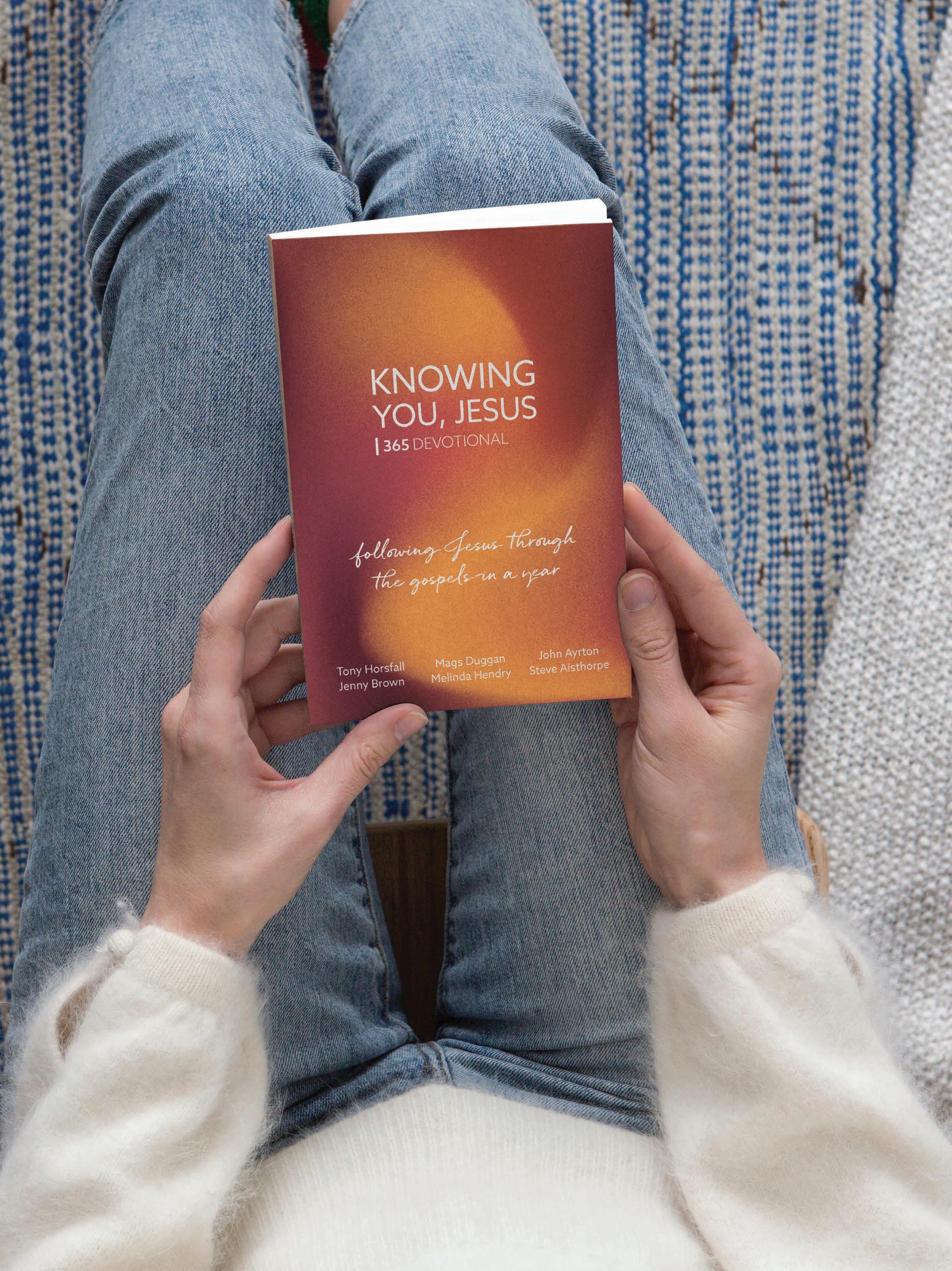
The publishing company, BRF, have kindly given Wider World an extract from their new book due out on 22 September: Knowing You, Jesus. This 365-day devotional encourages faith formation and intentional discipleship and is a detailed, chronological exploration of the life of Jesus of Nazareth, drawing from all four gospels. As readers immerse themselves in the gospel story, the idea is not just to understand it better but experience transformation into the likeness of Christ our Saviour.
Do you long to know Jesus more deeply? Do you want his example and teaching to shape you, to discover what it means to be a follower of Jesus today?
Well, here is an opportunity for you, an invitation to spend a year reading the gospels slowly and thoughtfully so you can grow in your relationship with Jesus. Whether you have been a Christian for many years or are new to the faith, these daily readings will inspire you to grow in love, knowledge and understanding.

Is this your desire?
If your answer is ‘Yes’, then read this book, and open yourself to the transformative power of the life of Christ.
Knowing You, Jesus is not a commentary. It will not explain every question that arises in the text or comment on everything of note. Neither is it an exposition, carefully explaining every point of interest in the text. It is a devotional guide with an emphasis on spiritual formation. Its purpose is to bring you face-to-face with the life and teaching of Jesus every day for a year, and then to see what happens. If you meet him with openness and honesty the whole process is likely to be highly transformative.
The inspiration for this approach is a twelfth century prayer from Richard of Chichester (1197-1253), a bishop well known for his godliness and care of the poor. In words that much later became well-known through the musical Godspell (could he ever have imagined that?), he expressed his own longing for spiritual growth like this:
Thanks be to you, my Lord Jesus for all the benefits you have given me, for all the pains and insults you have borne for me.
O most merciful Redeemer, Friend, and Brother, of you three things I pray: To see you more clearly, love you more dearly, follow you more nearly, day by day.
The book invites you to make this prayer your own, asking God that as you read and pray you may come to understand Jesus more fully (see), be attached to him more deeply (love), and apply his teaching to your life more completely (follow).
A unique feature of Knowing You, Jesus is that the life of Christ is arranged chronologically, so that we follow his story like a thread through all four gospels, from his birth to his resurrection and ascension.
You could use the book by yourself, but why not consider taking this journey in the company of another person, or even in a small group? You might meet monthly to share your findings and discoveries, consider any questions that have arisen for you, and discuss the practical application of your reading so that this exercise is above all transformative. Such a group could meet in person, and therefore be local, or could be online with an international flavourthe possibilities are endless, so use your imagination.
Even better, why not encourage the whole church to be involved? Imagine the impact this could have on a church if the whole congregation were to give themselves intentionally to the task of knowing Jesus more deeply?
Knowing You, Jesus is a collaborative effort from six writers, including Tony Horsfall and Mags Duggan. They all feel a great need to rediscover the basics of discipleship, which means returning to the source, to the gospel story, and meeting Jesus in a fresh way, free from the trappings and complications of churchianity.
Here is an extract from the book, written by Mags Duggan.
Luke 13:10-17
On a Sabbath, Jesus was teaching in one of the synagogues, and a woman was there who had been crippled by a spirit for eighteen years. She was bent over and could not straighten up at all. When Jesus saw her, he called her forward and said to her, ‘Woman, you are set free from your infirmity.’ Then he put his hands on her, and immediately she straightened up and praised God. Indignant because Jesus had healed on the Sabbath, the synagogue leader said to the people, ‘There are six days for work. So come and be healed on those days, not on the Sabbath.’ The Lord answered him, ‘You hypocrites!
Doesn’t each of you on the Sabbath untie your ox or donkey from the stall and lead it out to give it water? Then should not this woman, a daughter of Abraham, whom Satan has kept bound for eighteen long years, be set free on the Sabbath day from what bound her?’ When he said this, all his opponents were humiliated, but the people were delighted with all the wonderful things he was doing.
‘Eighteen long years’ ... until Jesus saw her – and set her free.
Jesus sees us. He sees us in all our brokenness and neediness, in all our crippling insecurities and fears. He sees all the things which bind us and which bow our heads low in guilt and shame and weariness. And when he looks at us, it’s through eyes filled, not with judgement, but with endless compassion for all that we are - and for all that we’re not.
On that day, this dear woman praised God because she realised she’d come face to face with the God David described as ‘the lifter of my head’ (Psalm 3:3); the God who declared to his people, ‘I have set you free; now walk with your heads held high.’ (Leviticus 26:13 CEV). From that moment on, she would literally walk with her head lifted high, a woman freed and free.
Hold tight today the truth that you are known; that you are seen by an infinitely compassionate Saviour who longs to release you from all that is bowing you down, all that is keeping you bound.
Lord Jesus, you see me, you know me, you call me into your presence to love me into freedom and healing. I come to you now. Amen.
Its purpose is to bring you face-to-face with the life and teaching of Jesus every day for a year, and then to see what happens.
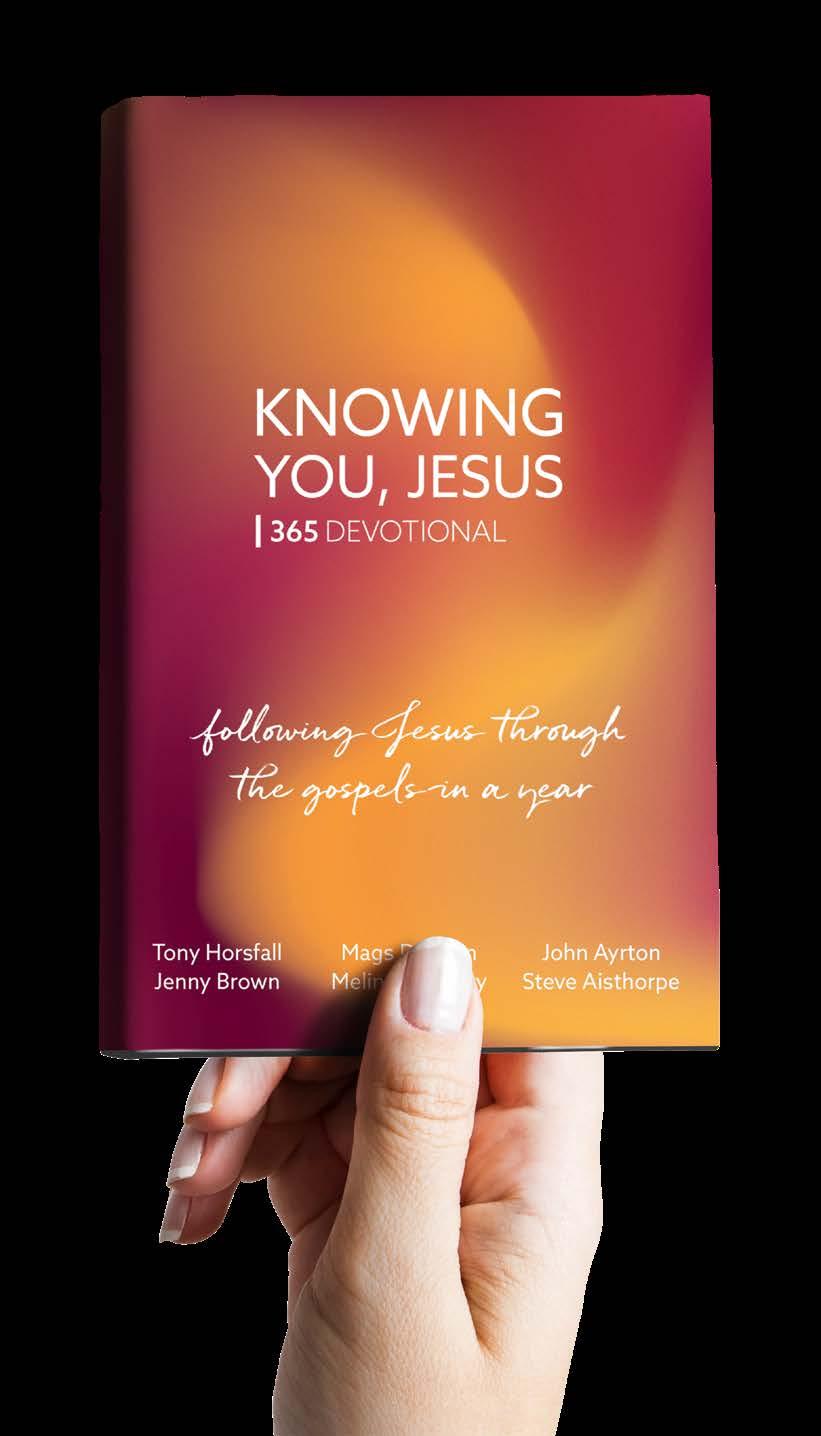
Following Jesus through the gospels in a year : 3 6 5 D e v o t i o n a l : 3 6 5 D e v o t i o n a l
pels inayear
nny Brown, John Ayrton, Steve
The book is priced £16.99 and is available to buy online from www.brf.org.uk
on the life of Christ on life
Nazar eth over the per iod of a year nthesises them into a chr onological account ell-loved author T ony Hor sfall focus on helping the r eader ʻlove Jesus mor e
nder of what it means to know Jesus to engage - Bible meditation, lectio divina, ding the Bible pr ayer fully
iscover or deepen faith
ional
T ony Hor sfall and Mags Duggan, and BRF Bible ontr ibuted
s for Bible weeks/Bible S unday
Steve Aisthorpe is a leader, facilitator, coach, researcher and author, with extensive experience in education, international development and faith-based organisations.


of Chichester ʻto see thee mor e clear ly, love thee . day by day', this 365-day devotional encour ages ip T ony Hor sfall, Mags Duggan, John Ayr ton, a Hendr y pr esent a detailed, chr onological h, dr awing fr om all four gospels. As we immer se only under stand it better but exper ience our S aviour
der with a lifetimeʼs exper ience in mentor ing ionar ies, both in Br itain and over seas

spir itual dir ector and for mer lectur er .
r iends Inter national, an exper ienced mentor and a All S ouls, Langham Place and with UCCF.
er . For mer ly a staff wor ker with UCCF, he is now er ve
John Ayrton is an ordained Baptist minister. Formerly a staff worker with UCCF, he is now involved in a member care role with Interserve.
Jenny Brown is senior staff worker with Friends International, an experienced mentor and a lay reader. She has previously worked at All Souls, Langham Place and with UCCF.
Melinda Hendry is Ministry Development Lead at Living Leadership, working particularly with women in ministry for their spiritual health and formation.
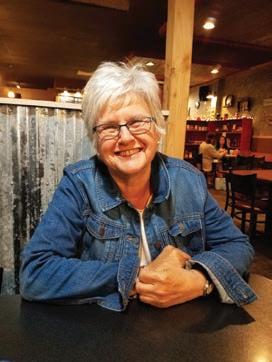


Tony Horsfall is an author and retreat leader with a lifetime’s experience in mentoring others, including church leaders and missionaries, both in Britain and overseas.

Rejoice always, pray continually, give thanks in all circumstances; for this is God’s will for you in Christ Jesus.
1 Thessalonians 5:16-18
Monaghan Presbytery held an evening with award-winning TV chef Paula McIntyre in Corvally church hall in March.
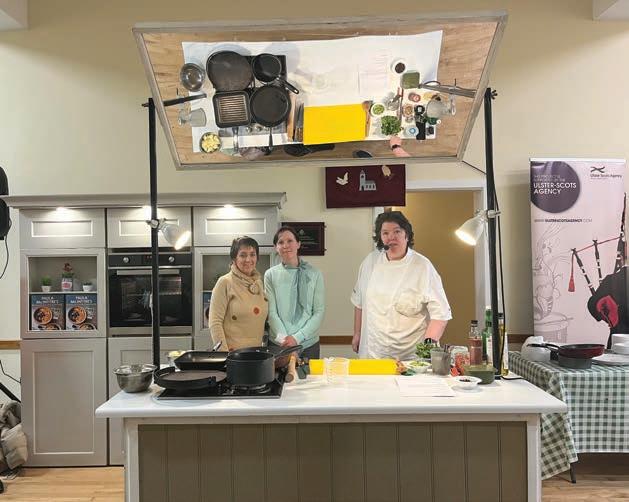
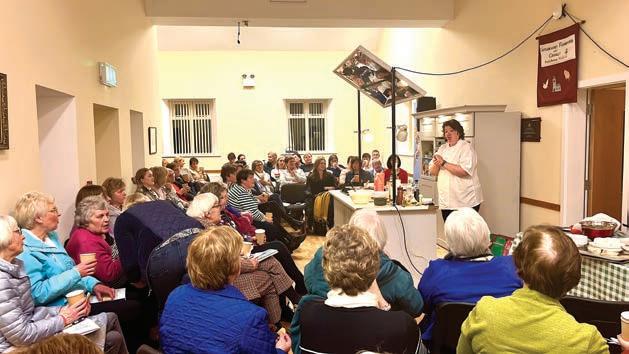
are Shelia McElwaine, Julie McAdam and PW committee members with Paula McIntyre.
Cavanaleck Presbyterian Women organised a family fun day to celebrate the Coronation of King Charles III and Queen Camilla. Those present enjoyed some quality time with their church family and other members of the community as they marked this historic occasion. The event included a wide variety of activities such as children’s sports, bouncy castles, fancy dress and face painting.
There was also an impressive display of royal memorabilia with artefacts from the reigns of George V, Edward VIII, George VI, Elizabeth II and Charles III, together with illustrations of the late Queen Elizabeth II with quotations from her speeches which demonstrated her deep Christian faith. Musical entertainment was provided by members of the church, and a delightful afternoon tea was served by our members. The occasion was blessed with brilliant weather which helped events to run smoothly. It was a most enjoyable afternoon for all.
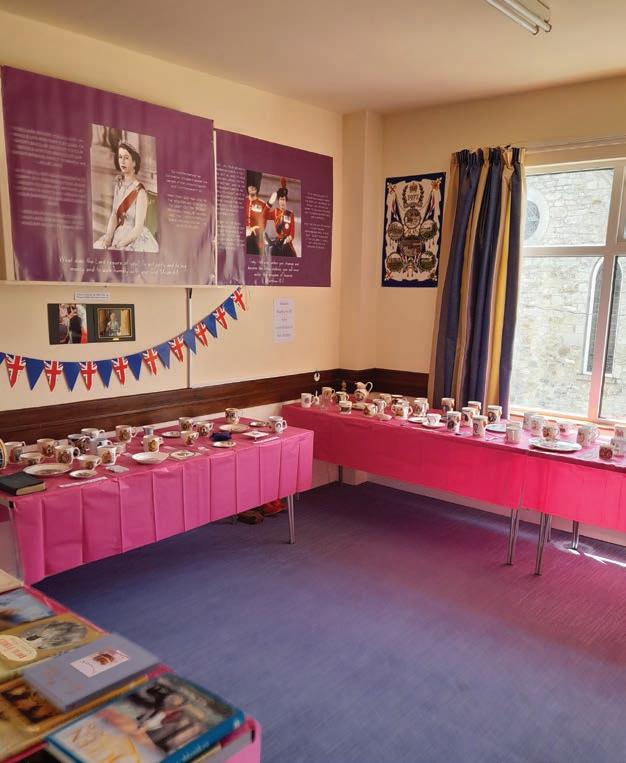
Ards Presbytery PW LINK’s AGM was held in May. We chose Cloughey Presbyterian Church for our venue because they had recently re-formed as a Presbyterian Women Group and we saught to encourage them. They made an excellent job of hosting our meeting.
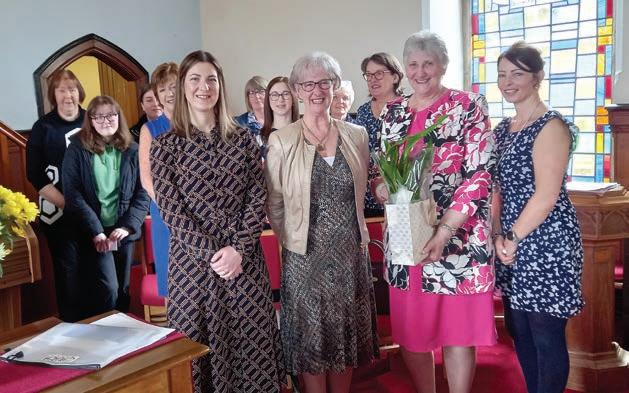
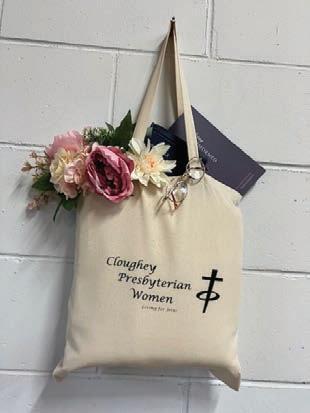
Our speaker was Rev Lesley-Ann Wilson, Chaplain to Woodlands Youth Justice Centre. She used the story of Zacchaeus to connect our theme of Being Transformed to her work at Woodlands.
Photographs show Patricia Dorrian and her team at Cloughey Presbyterian Women and the very attractive display they had prepared to welcome us, picking up our theme for this year.
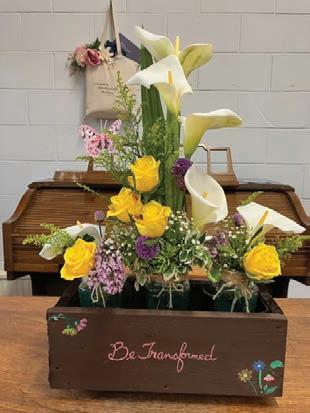
Magheramhamlet held their Special Wonder Woman (Presbyterian Women) service in April with Ann Wilson as their guest speaker. A soup lunch was held afterwards. Ann is pictured receiving a gift from Margaret Broome with members of the choir looking on.
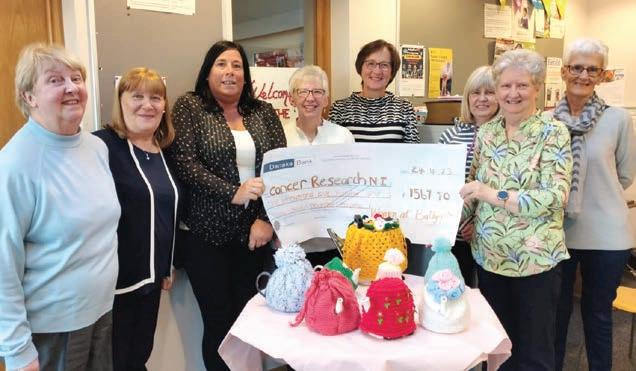
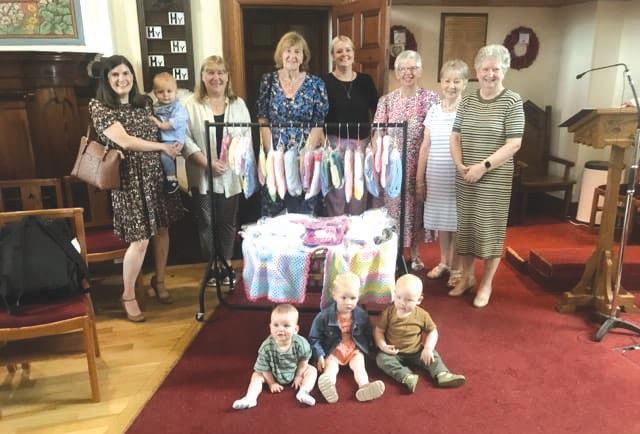
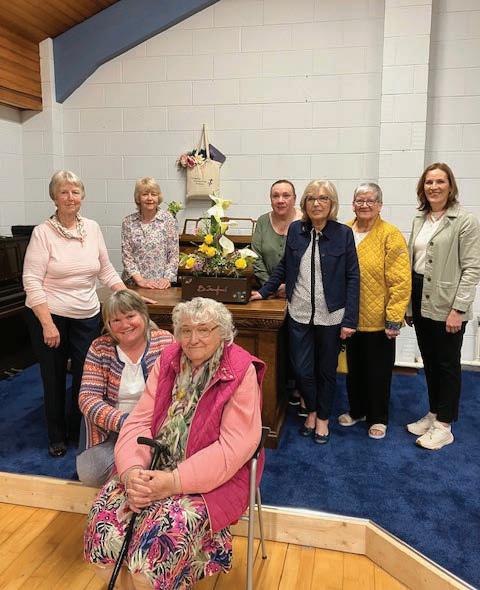
In 2023, Women @ Ballygilbert have been supporting two charities. Firstly, as with so many other women’s groups, we had our share of women diagnosed with various cancers. We wanted the opportunity to stand with them and support them. Our Afternoon Tea raised £1,567 for the worthwhile work of Cancer Research. Photograph shows some of our members as we presented a cheque to Ruth Browne (third from left), a representative of Cancer Research.
Our second charity was Tiny Life. We linked with our Mission Group and our Coffee and Chat group to provide financial aid of £1,500 and many, many sets of beautifully knitted blankets, cardigans and hats. Our photograph shows some ladies of our church with Lyndzi Caughey, a representative of Tiny Life, (fourth from the left) receiving these gifts at our children’s day service along with some of our own little ones – Charlie, Luca, Georgia and Ronan.
Ladies of Crumlin celebrated 70 years of women’s ministry in the congregation with a lunch held at Brownlow House, Lurgan in January 2023.
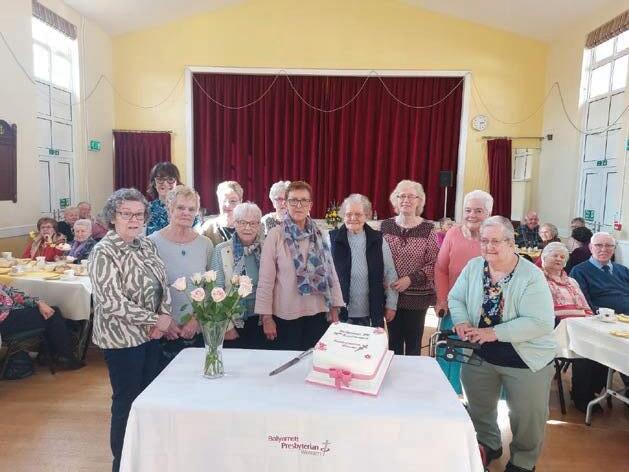
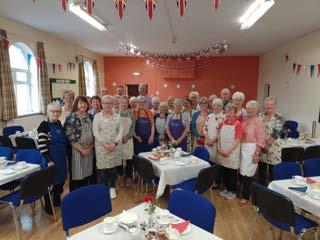
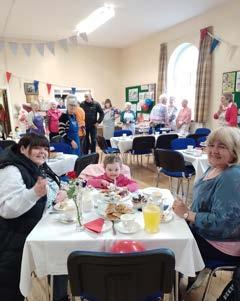

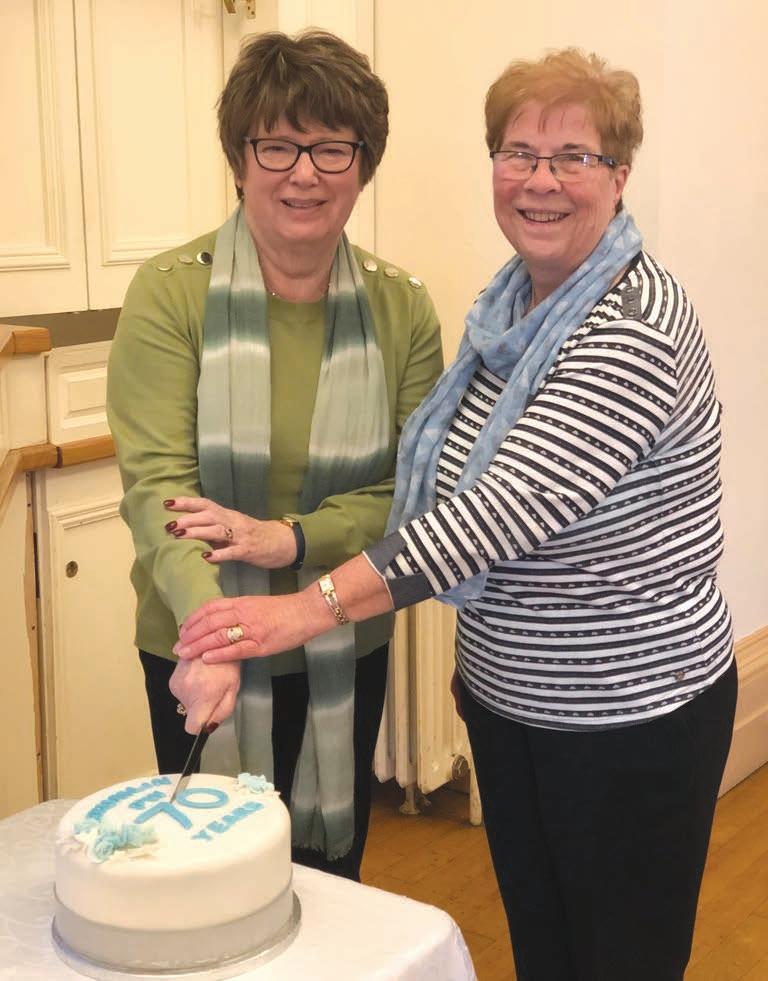

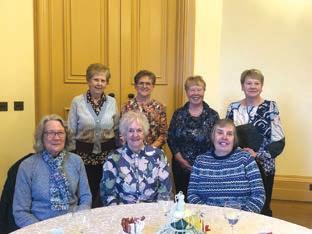
After lunch, members reminisced on events in the life of the congregation over the past 70 years aided by a PowerPoint presentation prepared by Katherine Price.
To mark the occasion Elizabeth Brown (Secretary) baked and decorated the anniversary cake which was cut by Elizabeth Kennaway (former Group President) and Margaret Livingstone (current Group Leader).
Scarva Street Presbyterian Women Group hosted a Coronation coffee morning which raised £2,400 for their church’s building project. Pictured are PW members Rosemary and Irene being served coffee by Willa also a PW member, also pictured is Victoria, her daughter Aimee and granny Kathleen; and finally the team of PW and Men’s Fellowship willing helpers who organised the event.
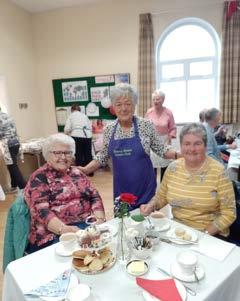
Ballyarnett Presbyterian Women celebrated 70 years of fellowship in March with a Daffodil tea attended by members, friends from other PW Groups, and members of the congregation. They were entertained by Mr and Mrs Ken Mclean who performed some ballroom dancing and encouraged us all to take part in country dancing.
The members of Garryduff PW in Ballymoney held a spring tea. This was a very successful event and we raised £1,436 which was split between two local charities - Cancer Research UK (CRUK) and Christians Against Poverty (CAP).
Pictured at the cheque presentation are Group Leader Rosaleen Barkley, with our committee members and some of our members with Gordon Robinson and Diane Jinks from CAP.
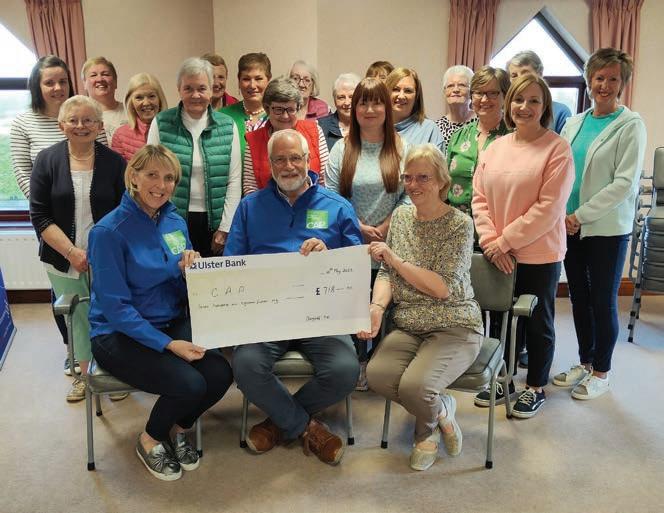
Outing
For our annual outing in June, Mourne Presbyterian Women visited The Green Holiday Cottage which is near Kilkeel. The evening began with a walk along the river and a tour of the beautiful self-catering accommodation.
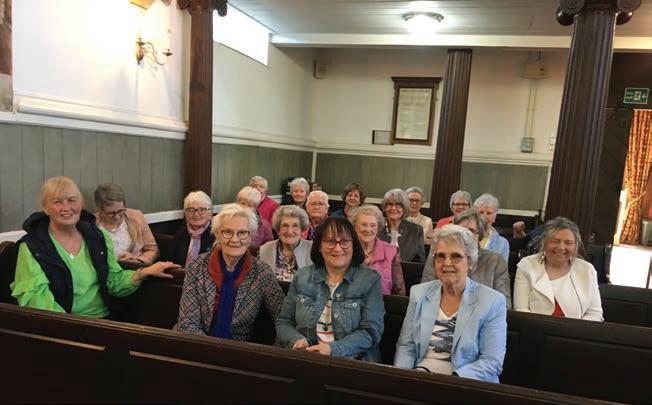
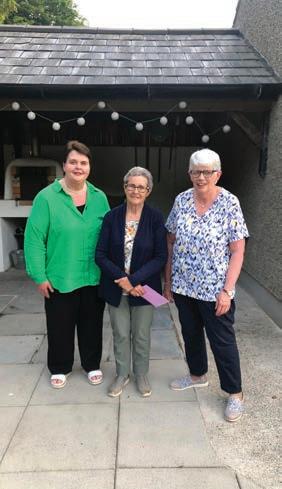
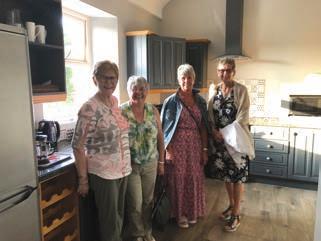
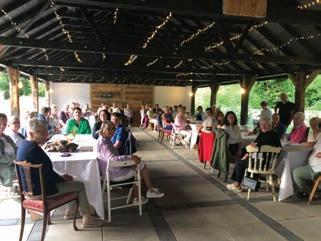
This was followed by a delicious meal served by the Top Nosh caterers and then a brief history of The Green from the owners, Mark and Jenny Hanna who told us how the Green Holiday cottage came to be. This was followed by a presentation to Sylvia Blue for her dedicated service as Wider World Agent.
Pictured are Sylvia Blue (centre) who was presented with a gift by Janet Bingham, PW Group Leader (right). Also, pictured is Zelda Skillen, incoming Wider World Agent.
Editor’s note - We add our thanks and gratitude to Sylvia for your years of faithful service to the magazine!
A group of women from PW@Dungannon recently held their annual outing to Clogher with a visit to St McCartan’s cathedral where they viewed the replica of the Cathedral which was knitted during the pandemic by the Knit, Stitch and Natter group. They were also given a brief history and tour of the cathedral. Following this they visited ‘Hope 4 U’ Foundation, Clogher Court House where they enjoyed a beautiful meal and were given an update on how this Christian community outreach centre is reaching out and helping all age groups in the Clogher Valley.
Have you a good-news story to tell us about your PW Group or women’s ministry project? Is there something you are grateful for that you would like to express to our readers? Please email up to 150 words and attach to the email any relevant photographs to pw@presbyterianireland.org
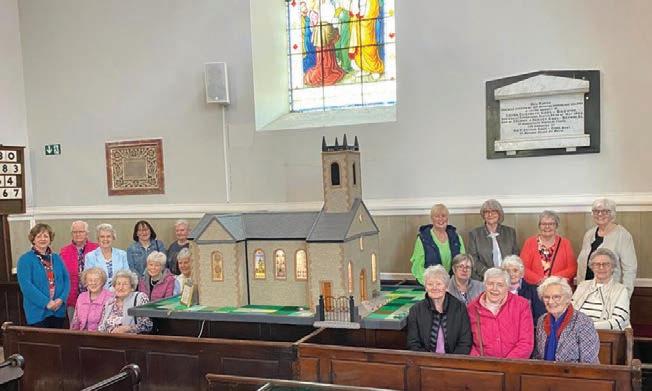

Mission Department, Presbyterian Church in Ireland, Assembly Buildings, 2-10 Fisherwick Place, Belfast, BT1 6DW Tel: +44 (0)28 9041 7263 Email: mission@presbyterianireland.org Website: www.presbyterianireland.org/mission
Information included in Global Mission News is supplied by the PCI Mission Department. While it is correct at the time of writing, which is normally some weeks before publication, readers should be aware that some details may subsequently change.

Up-to-date news and information are available online at: www.presbyterianireland.org/mission.
Praise the Lord for preparing ahead of us the contact with a really important and experienced TEE expert who was willing to allow the publishing about his experience with TEE in Ethiopia and the continent-wide TEE training he conducted in the 1970s/1980s. We thank God for moving a project forward in such an unplanned, unexpected and surprising way.
Please pray for Malawi as the last few months have brought many challenges. Cyclone Freddy in March hit alongside Malawi’s most severe cholera outbreak on record, with concerns that impacts on sewage and water systems will facilitate the disease’s spread.
- Please continue praying for the flood victims of Cyclone Freddy and for the government to restore services. The most affected part of Malawi is the southern region including Nsanje, Chikwawa, Thyolo, Blantyre, Mwanza, Mulanje, Phalombe, Chiradzulu, Neno and Zomba districts.

- Please continue to pray for the health and safety of the whole family.
- The John the Baptist evangelism events in both Peixinhos and Beberibe were really encouraging with lots of people turning up. The volunteers in both communities were so thankful to God for how everyone worked together and for the fact that it didn’t rain. In Peixinhos, it had rained all day beforehand but stopped for our evening presentation! The wordless book colours could be seen all over the streets in Peixinhos. In Beberibe, the choir, drama, memory verse and puppets, together with the ´cordel´ of John the Baptist (northeastern cultural reciting of a poem), went really well.
- Give thanks for the various evangelistic events in the communities during the John the Baptist season and pray that the Holy Spirit will continue to speak to those who heard the message.
- Continue to pray for the Reading in the Park activities and the contacts made particularly with many of the parents who are coming and showing a real interest in what we are doing.
Personnel News
Diane Cusick, PCI global mission worker in Zambia, has made a good recovery from illness and returned to Zambia at the end of August with a view to resuming her work in the field of early childhood development with the Zambia Synod of the Church of Central Africa Presbyterian (CCAP). Please continue to remember Diane in prayer as she makes the transition to life and service in Zambia.


James and Heather Cochrane, PCI global mission workers in Portugal, have handed over responsibilities at the Pedras Vivas congregation in Porto and returned to Ireland on 14 July for home assignment. This includes a deputation programme in the autumn and a period of sabbatical. Please pray for James and Heather as they share the story of their church-planting work in Porto, and take time with family to rest, reflect and seek God’s guidance for the future.
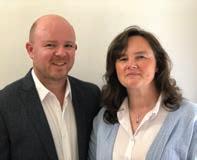
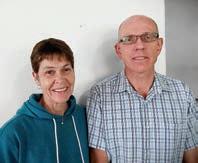

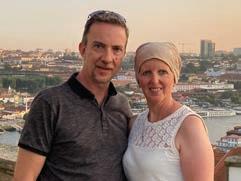
Overseas Visits
Rev Uel Marrs, Global Mission Secretary, represented PCI at the Reformed Church in Hungary’s International Partners’ Consultation from 14–18 July in Budapest, Hungary and in Transcarpathia. The focus of the consultation was on partners’ shared experiences, concerns and hopes for the nation of Ukraine.
Being Global Disciples is a short booklet designed to help congregations think through how to develop and sustain a lively, whole church, involvement in global mission. It unfolds two aspects of congregational participation centered on developing one or more deep connections with a person, place or project which is the focus for a deep ongoing relationship. Alongside engaging with a range of easily accessible PCI initiatives which enable exposure to, and involvement in, the breadth of what God is doing in the world.
Suggestions are designed to be readily integrated into the existing rhythms of church life and so do not demand a lot of extra effort to create space on already busy congregational agendas.
Copies can be ordered online or via the office priced £1 each.

Naomi Keefe Da Caixa Postal 73
Codigo da agencia 32300018 AC Central Recife Avenida Guararapes 250
CEP 50010970 Brazil
Stephen & Angelina Cowan PCEA Tuum PO Box 13
Baragoi via Maralal 20601
Kenya
Naomi & Thomas Leremore PO Box 23450-00100
Nairobi (GPO)
Kenya
Gary & Mary Reid PO Box 846-20500
Narok Kenya
Volker & JinHyeog Glissmann PO Box 30048 Chichiri Blantyre 3 Malawi
Derek & Jane French Calle Lekueder 9, 4A 48940 Leioa Spain

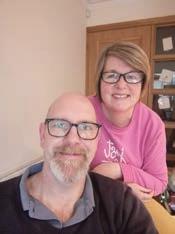
James & Heather Cochrane Rua Monte da Mina, 4466 3 Dto. Leça do Balio 4465-693 Matosinhos Portugal
Steve and Rosie Kennedy Str. Sanatoriului 29
Cluj-Napoca 400000 Jud Cluj Romania
Csaba & Ilona Veres Str Intre Lacuri 43 Cluj Napoca Jud Cluj Romania
Edwin & Anne Kibathi
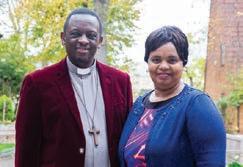
Partner Church Mission Workers 167 Wickhay Basildon Essex SS15 5AQ ENGLAND

